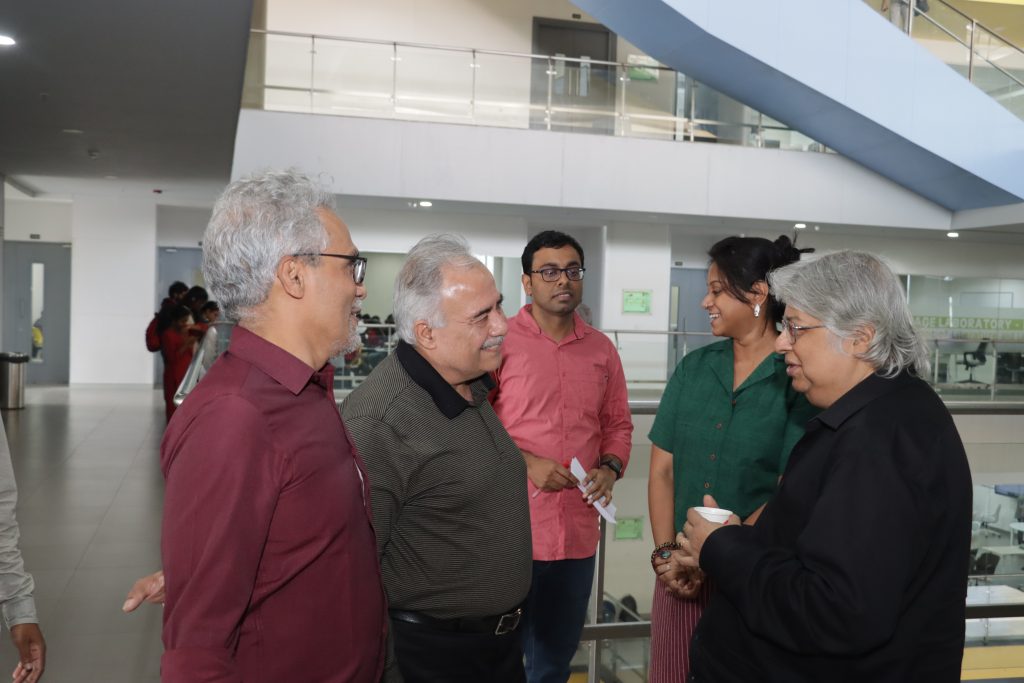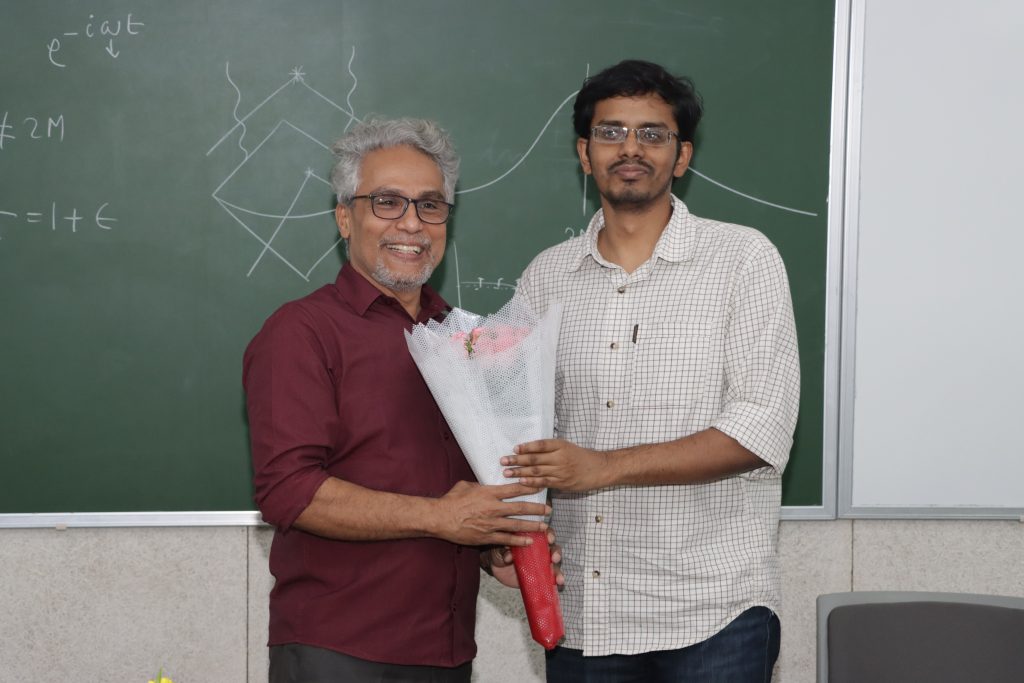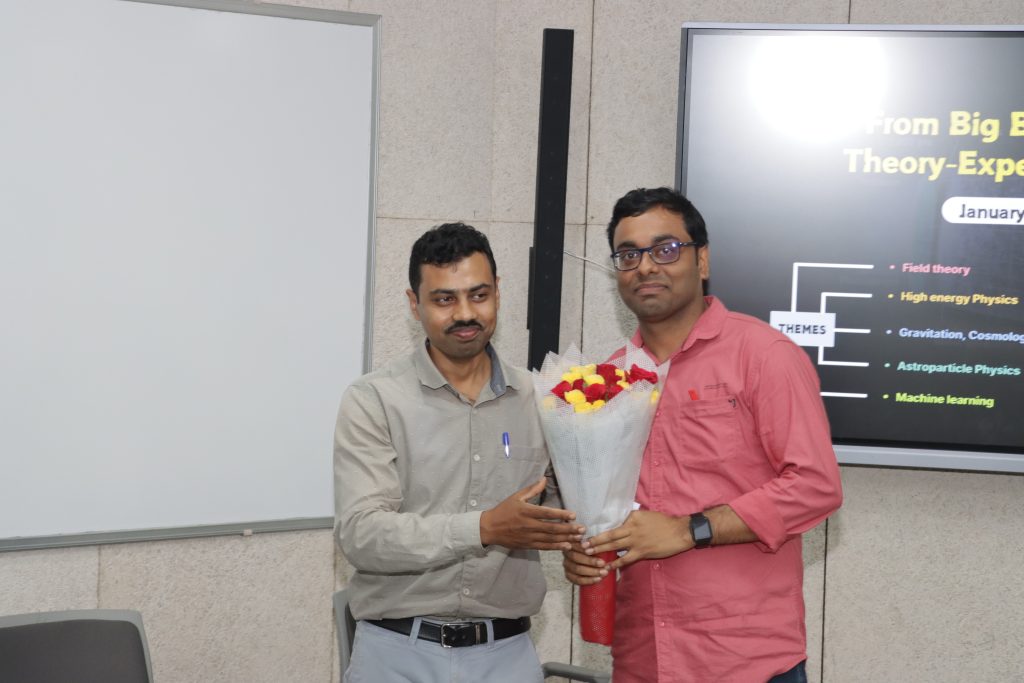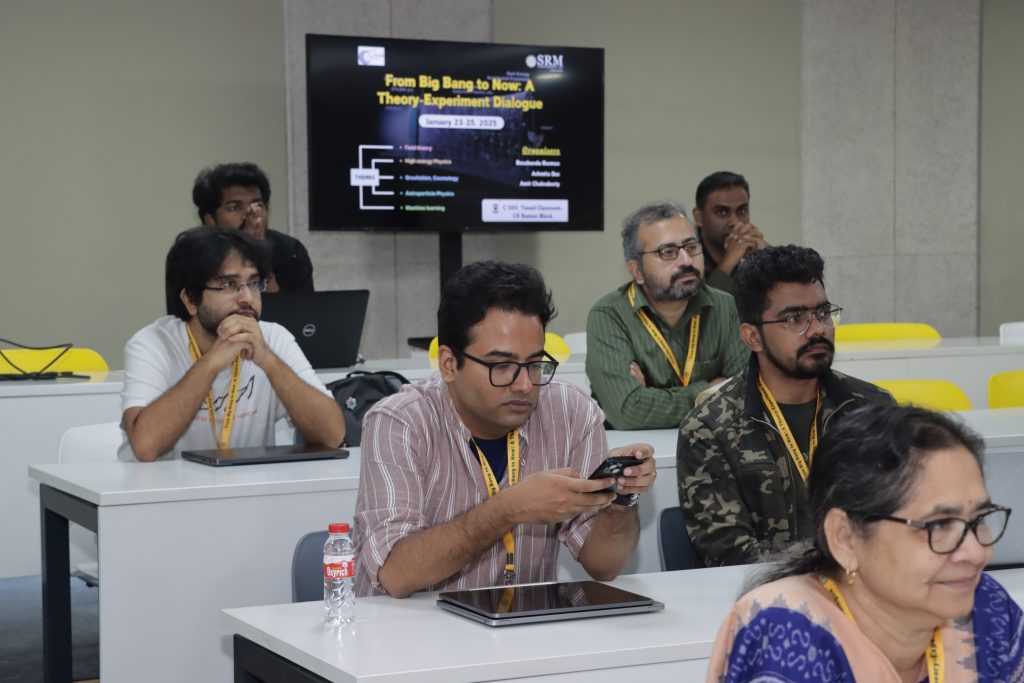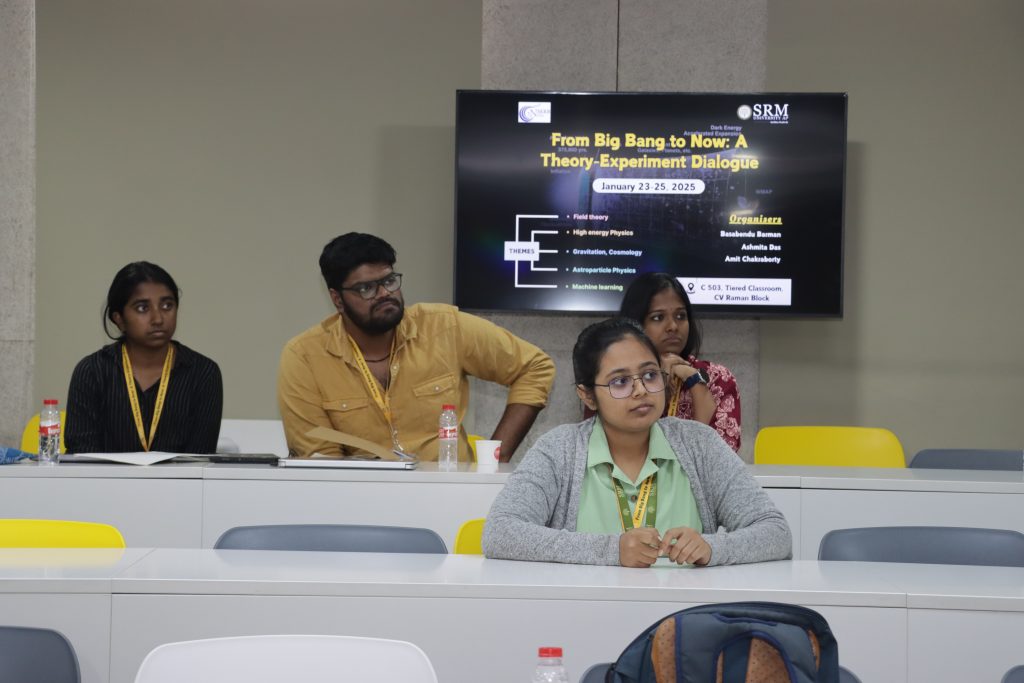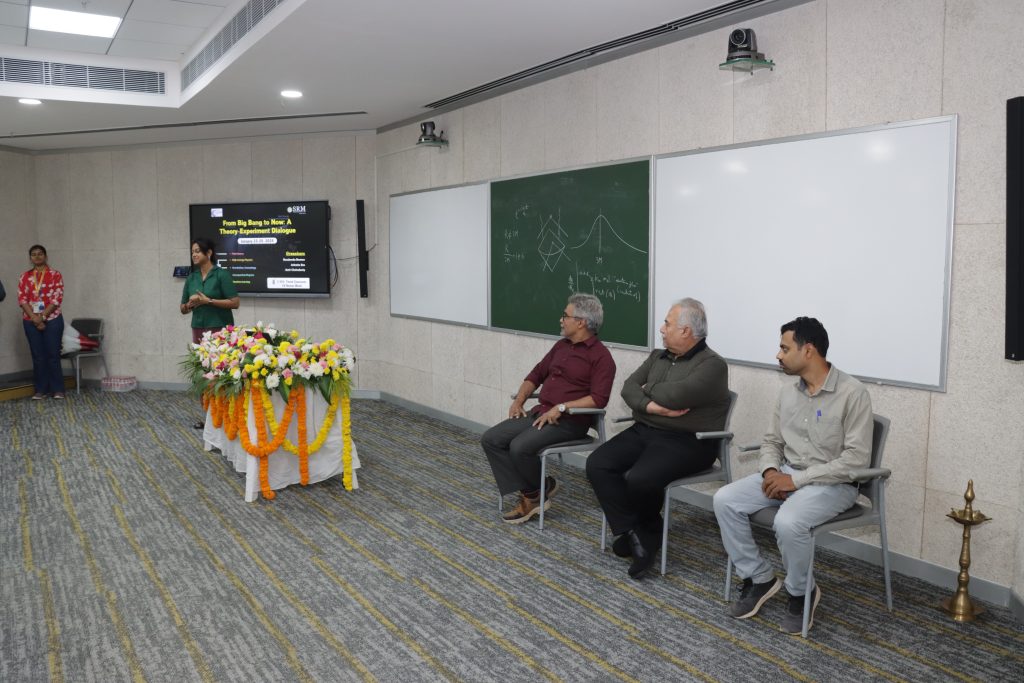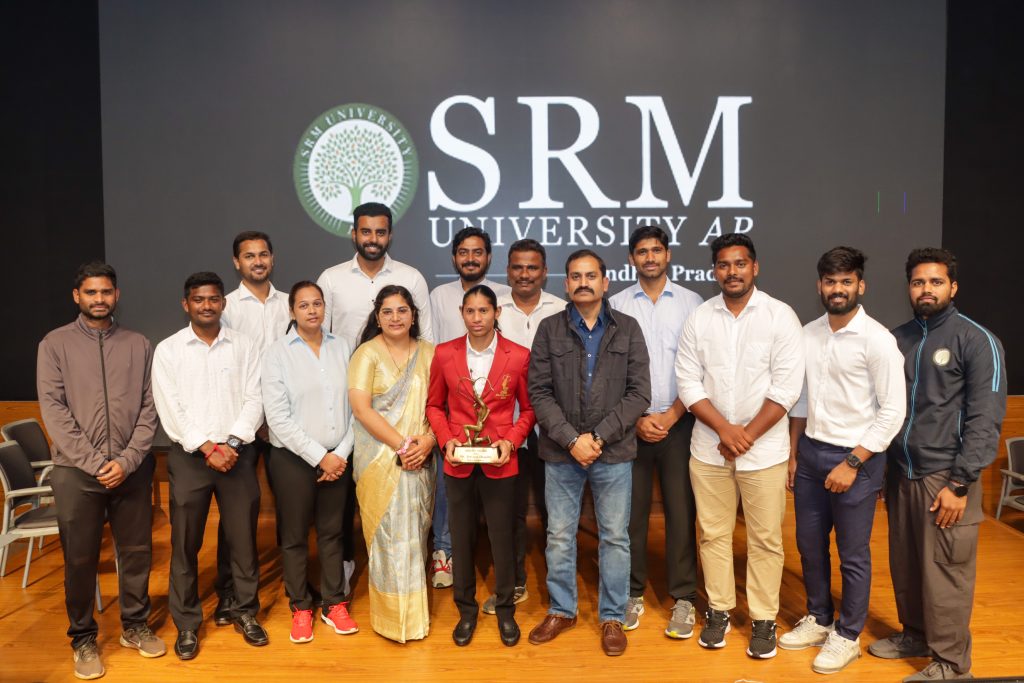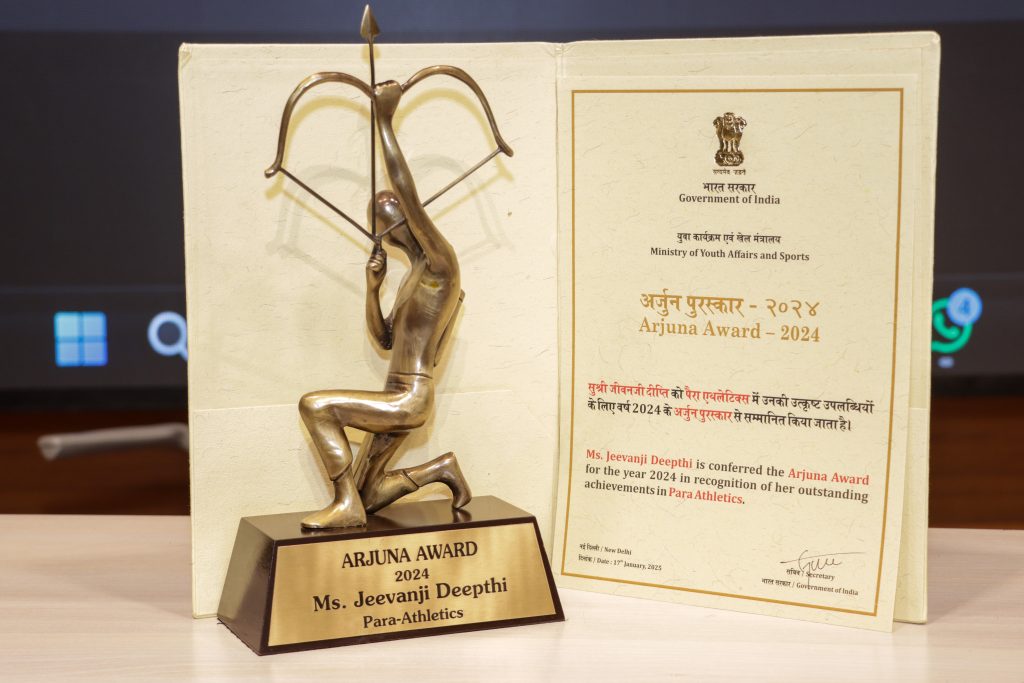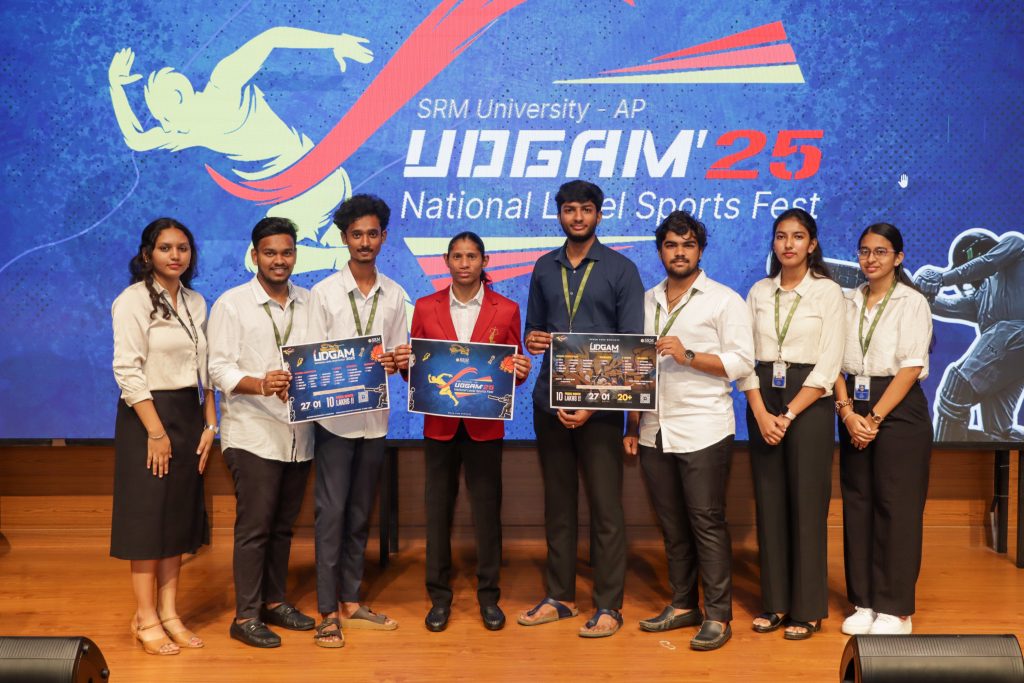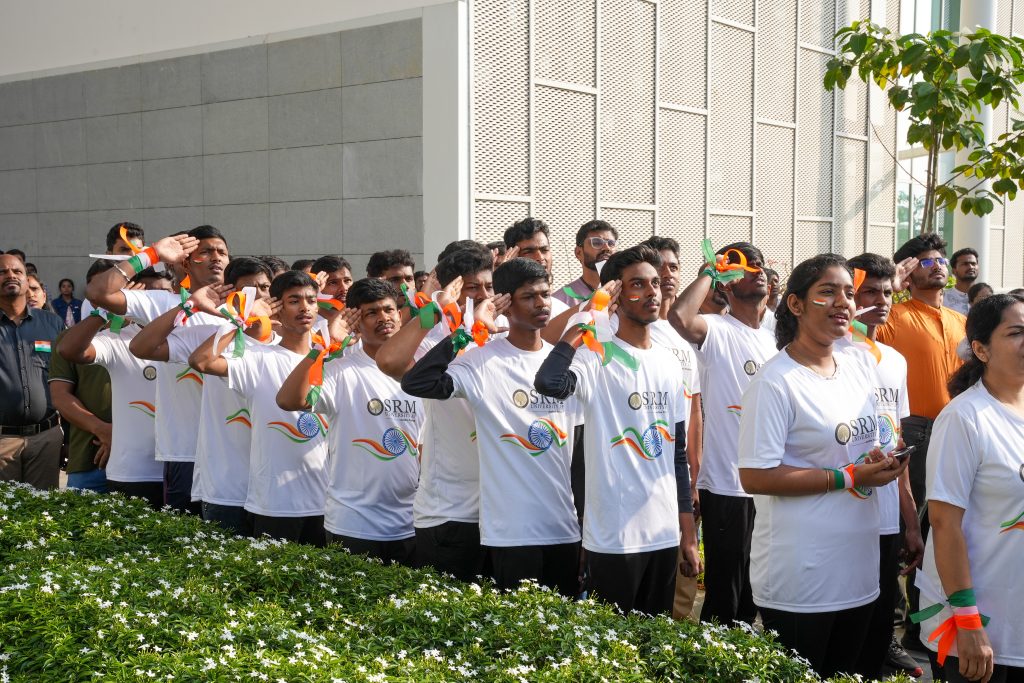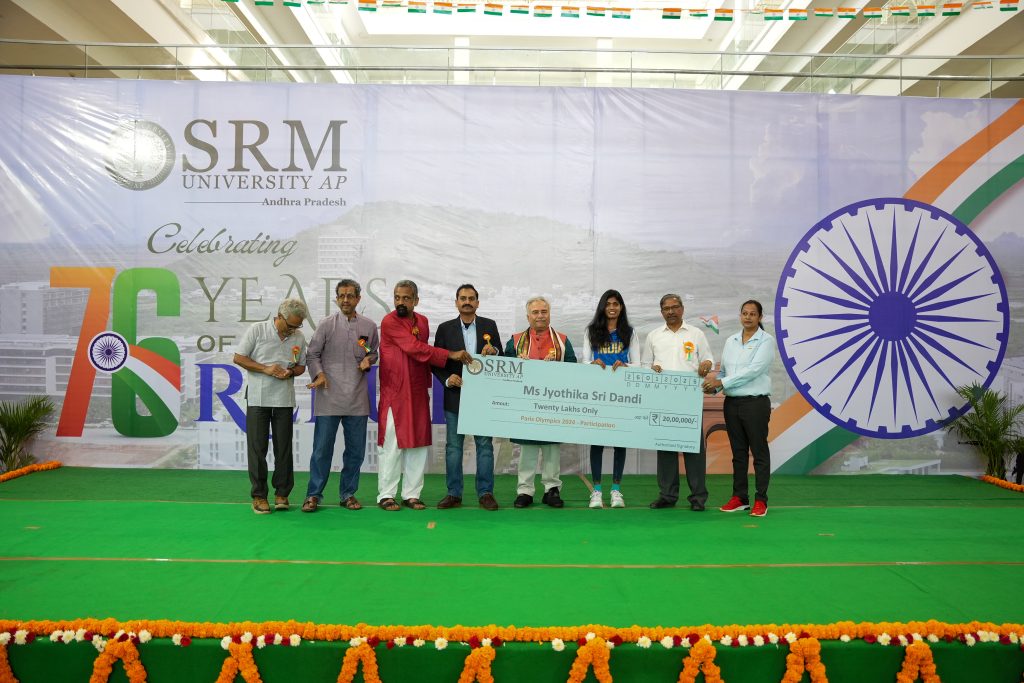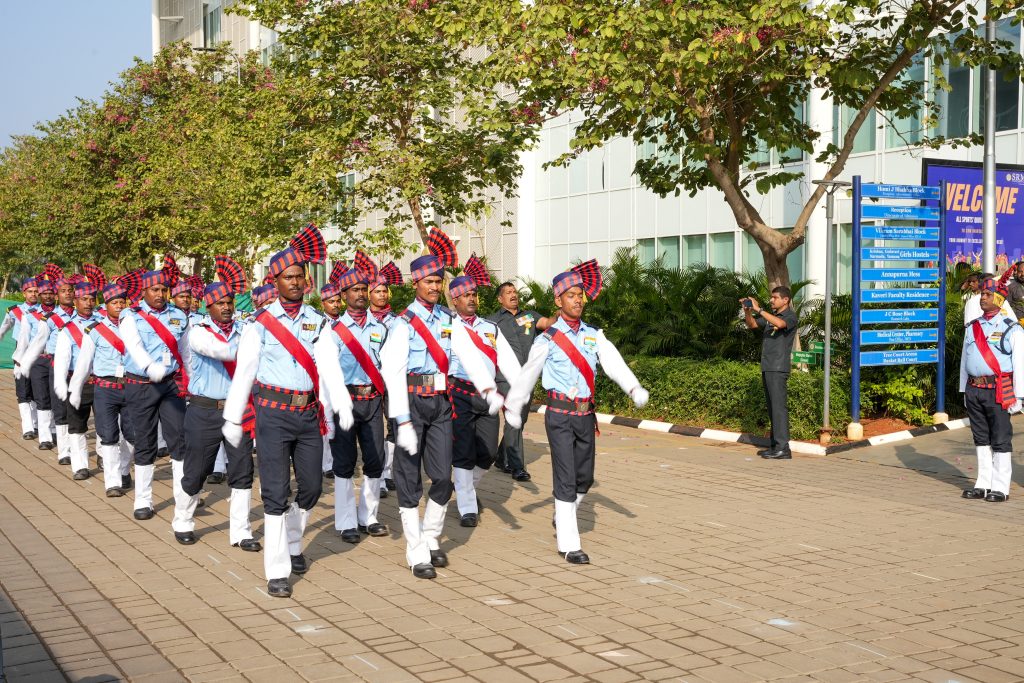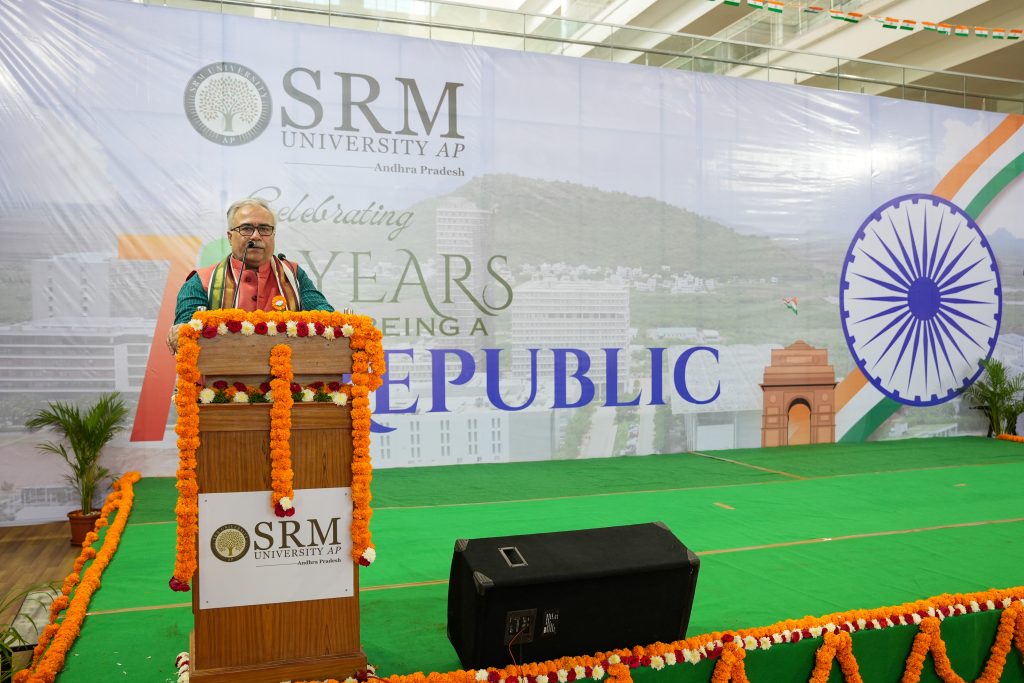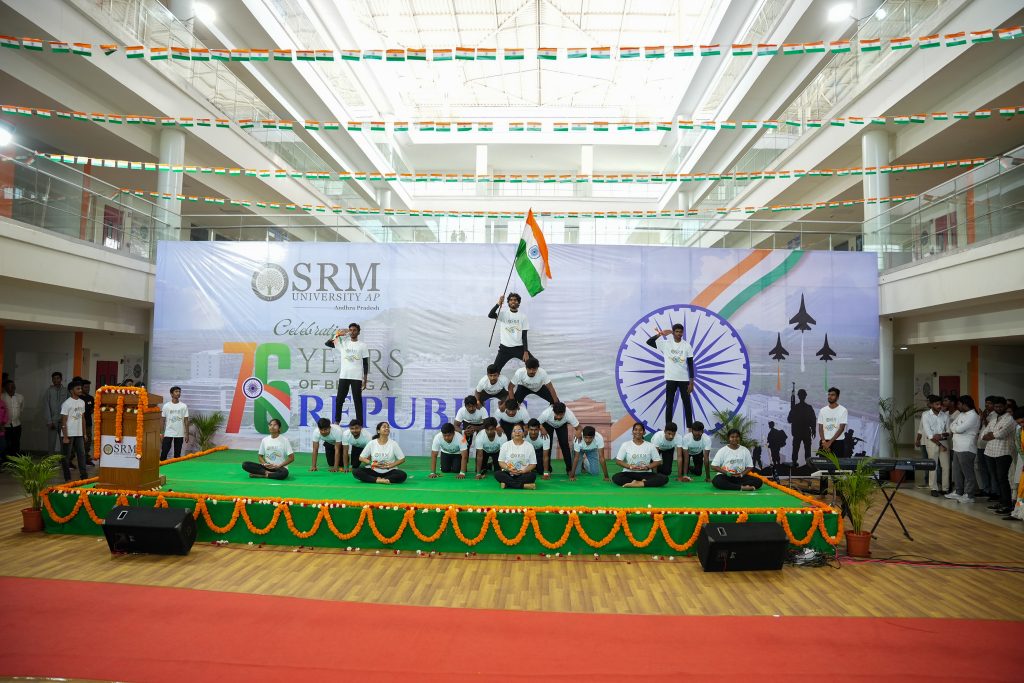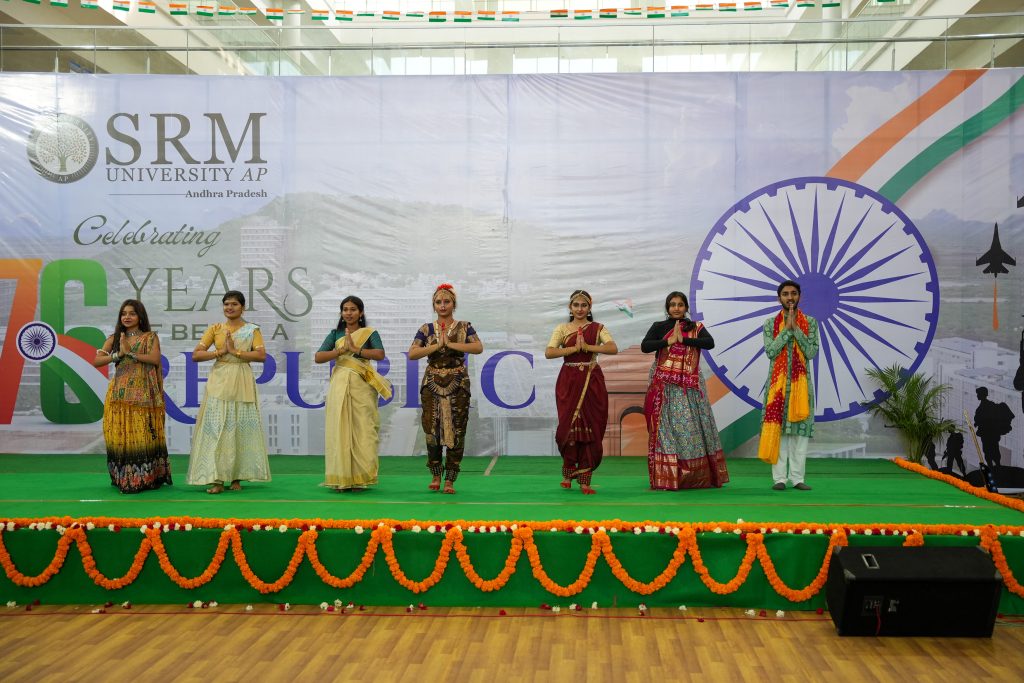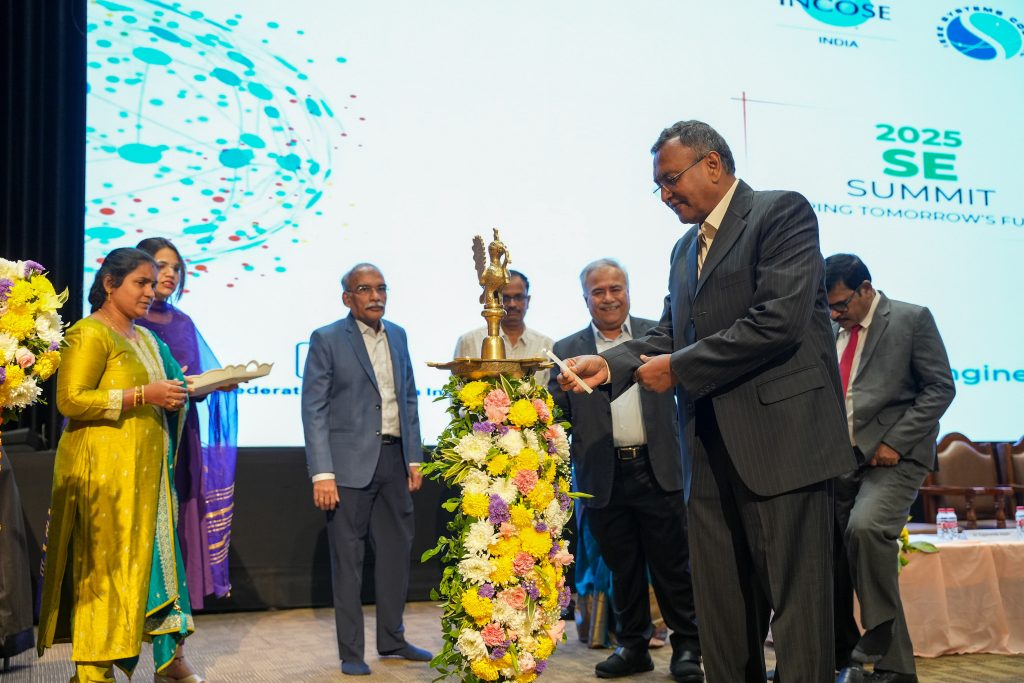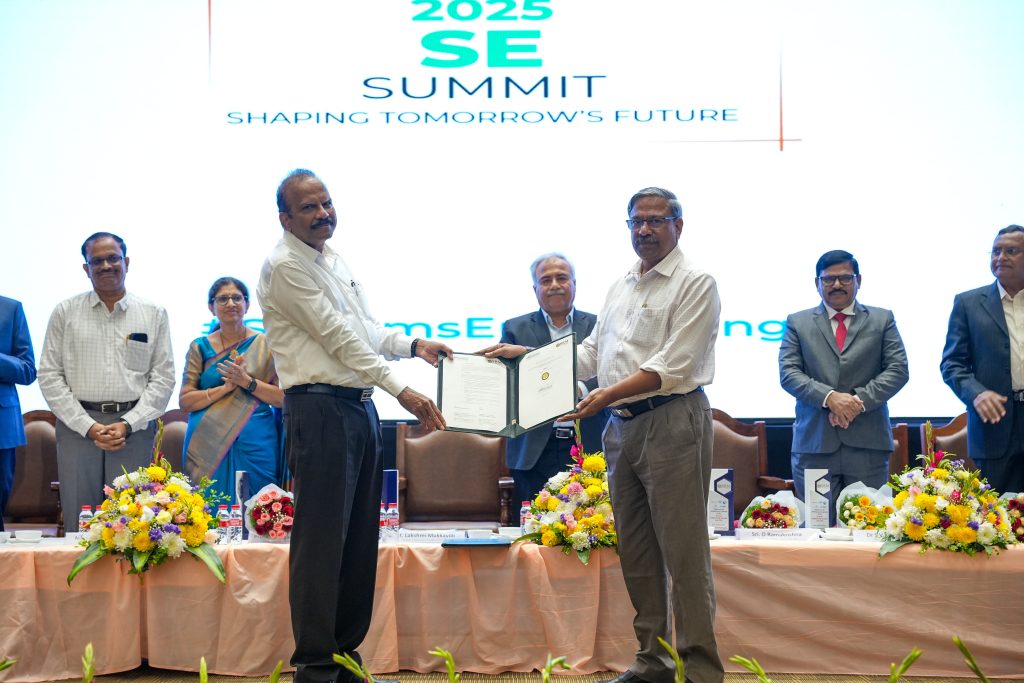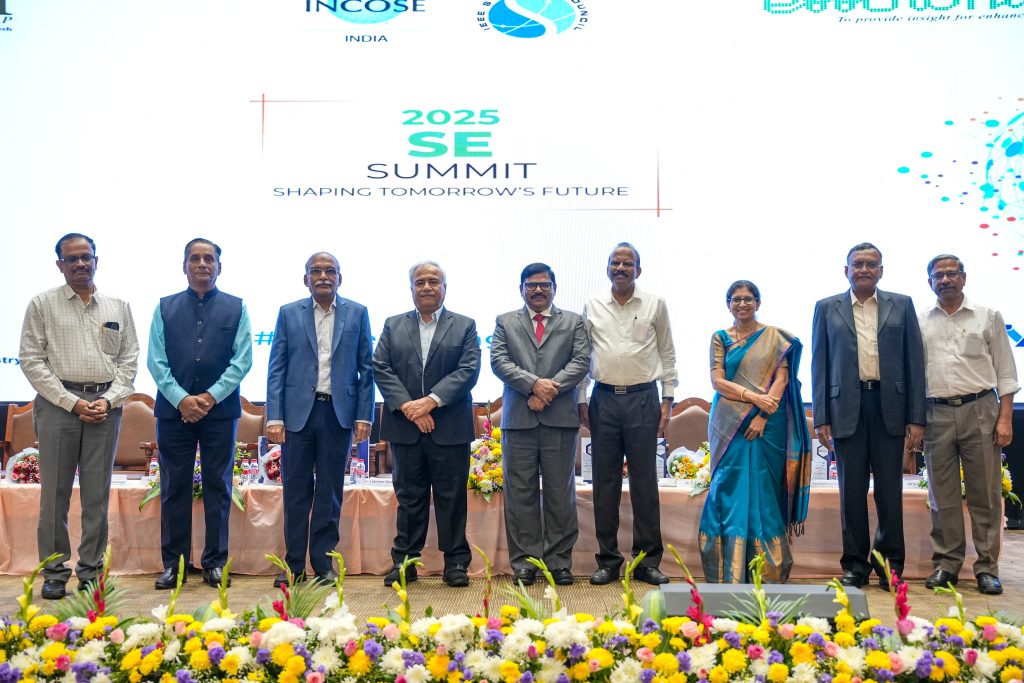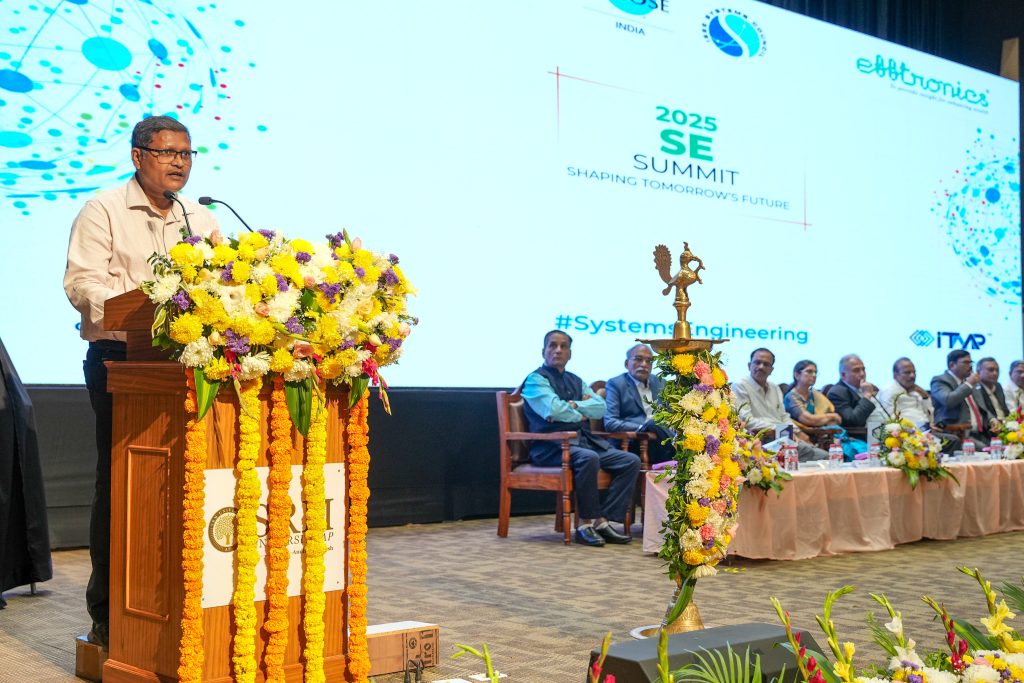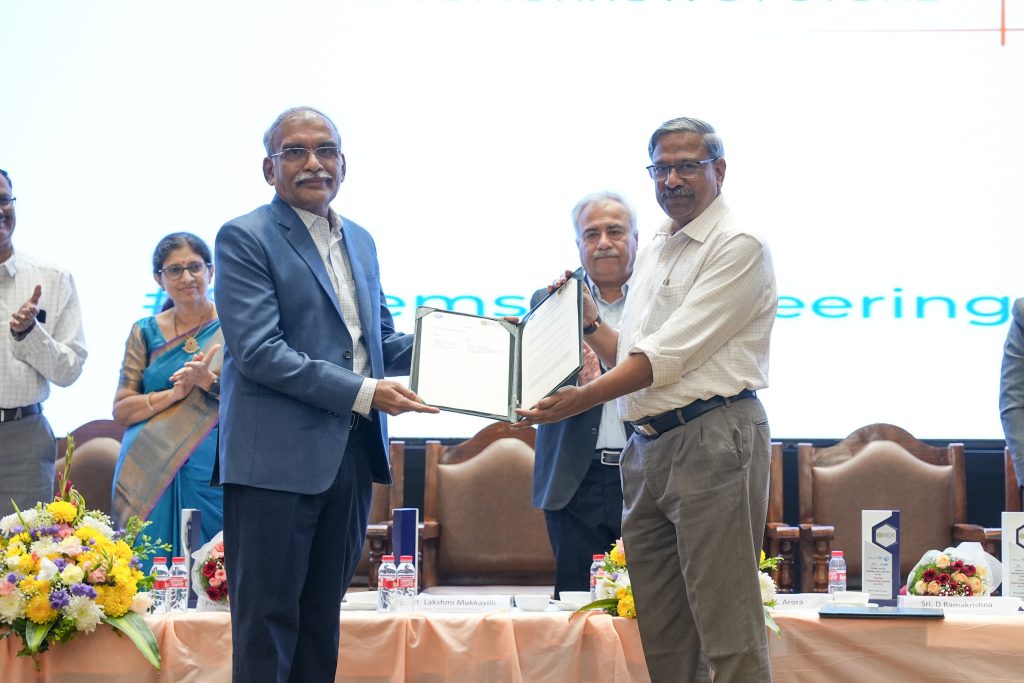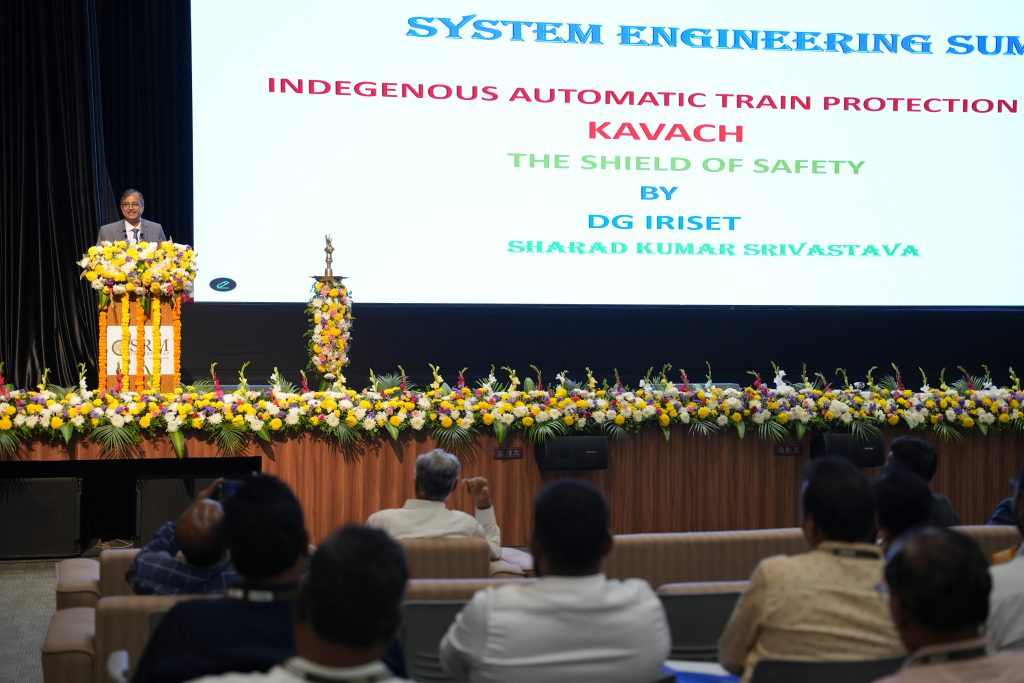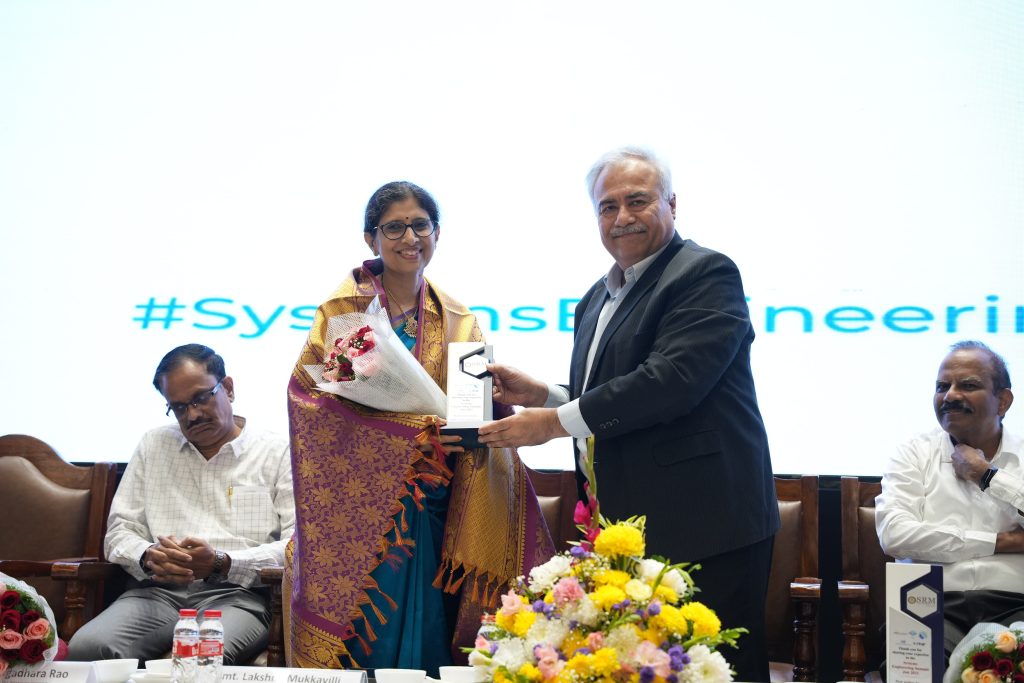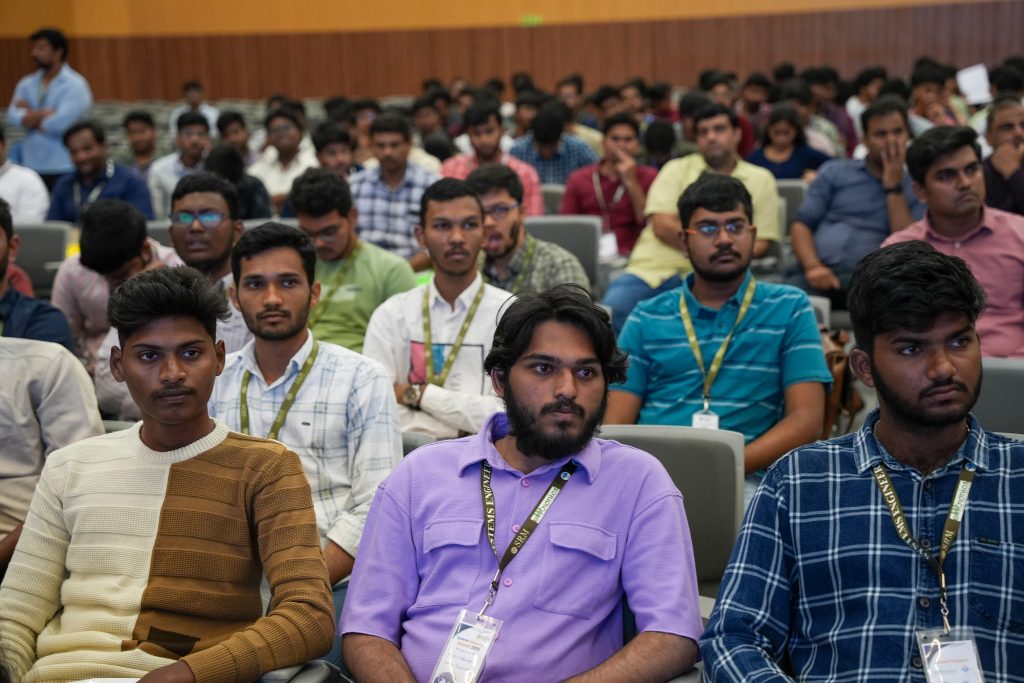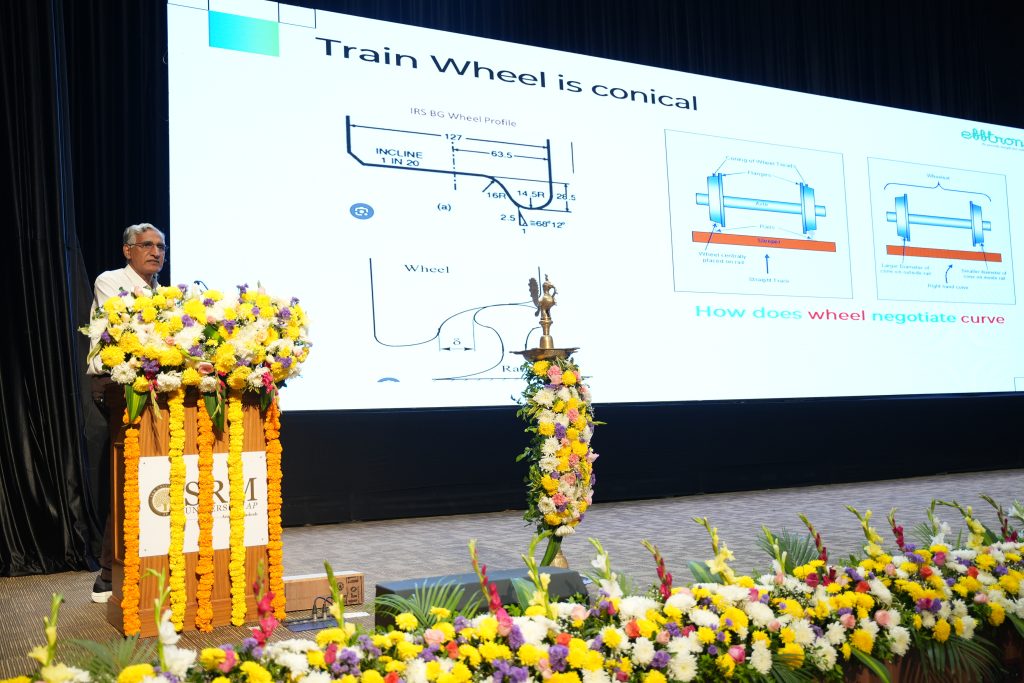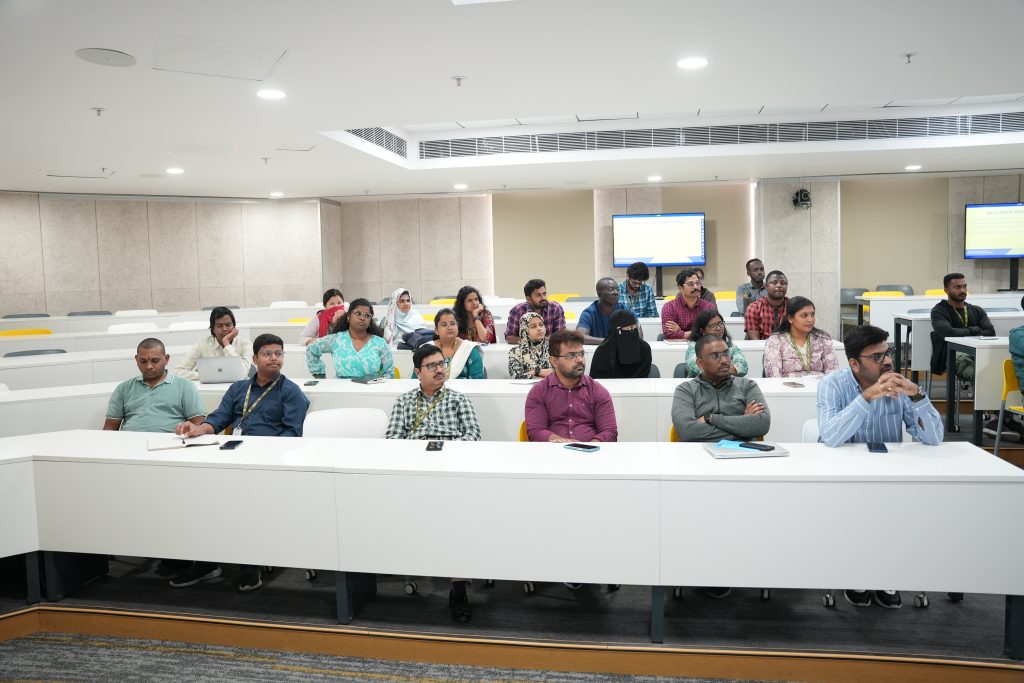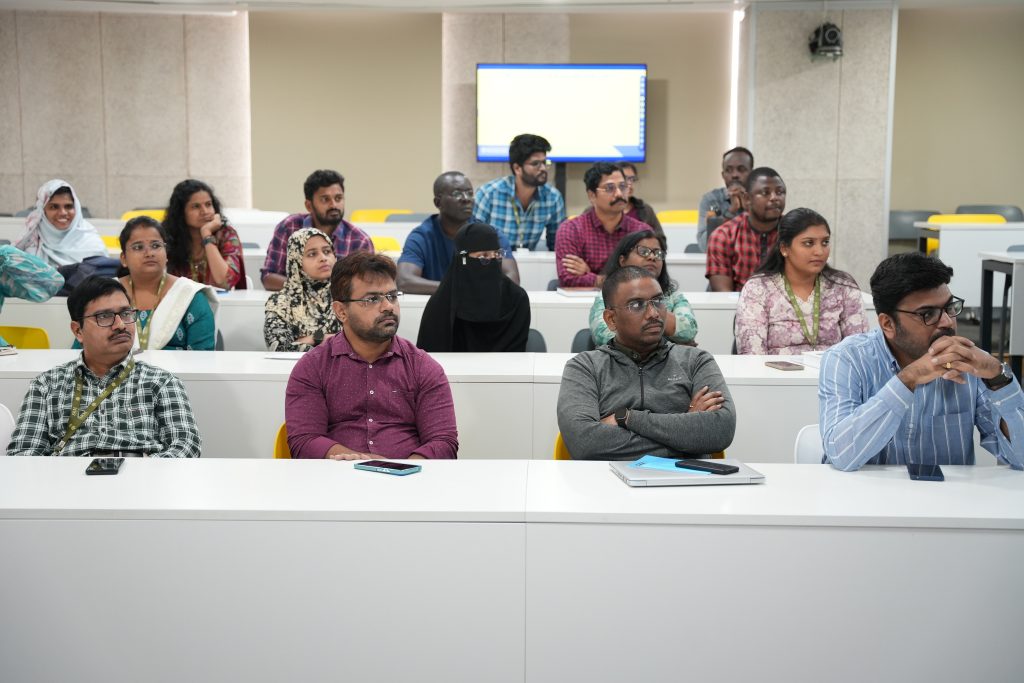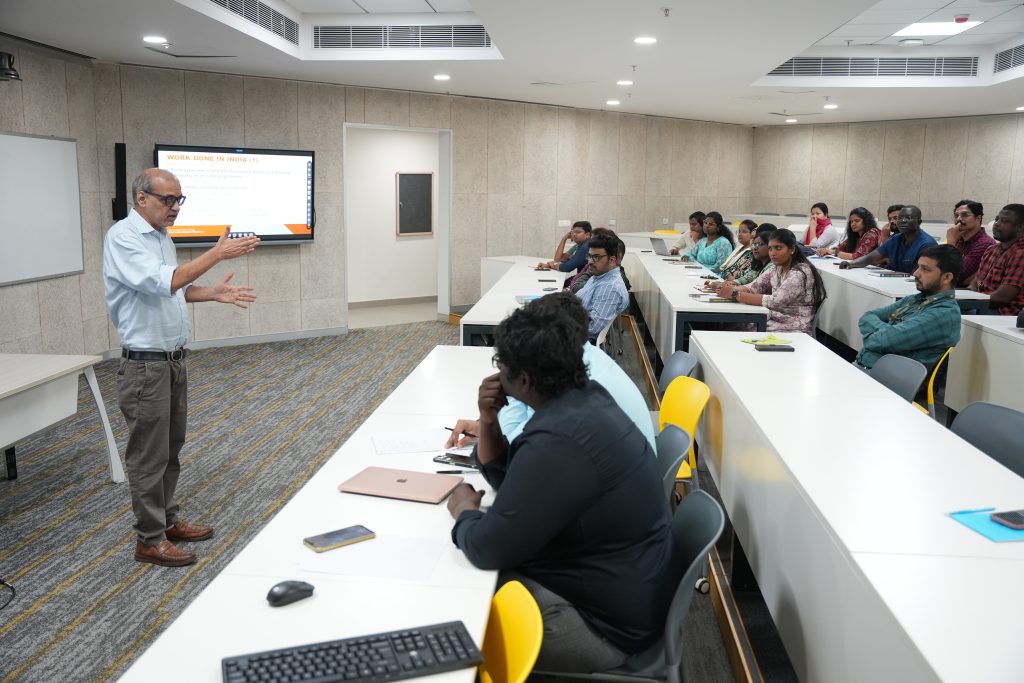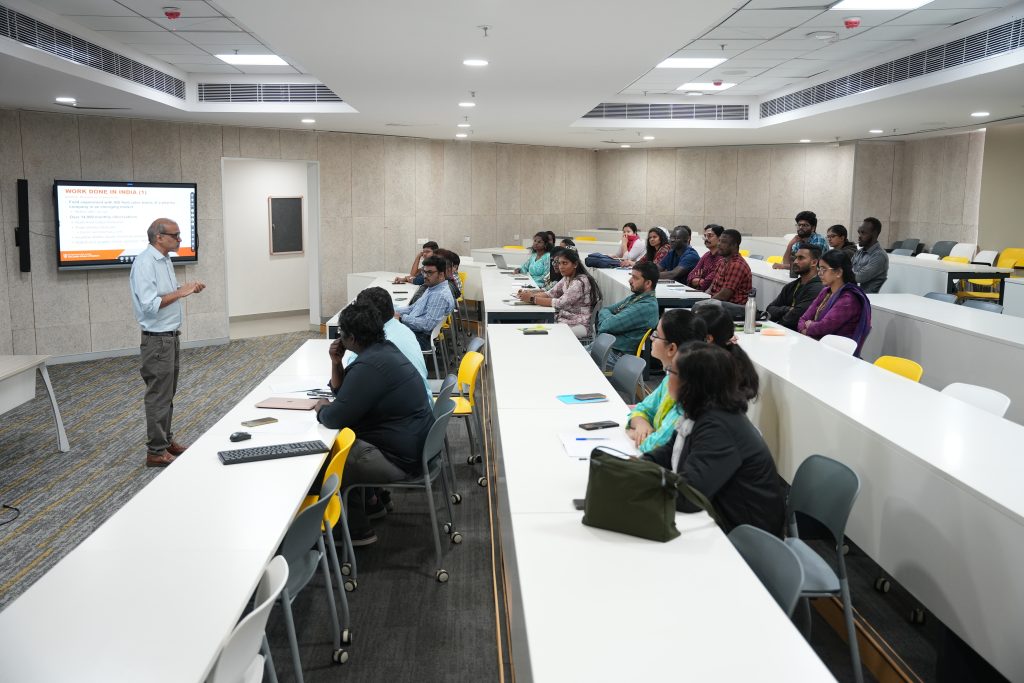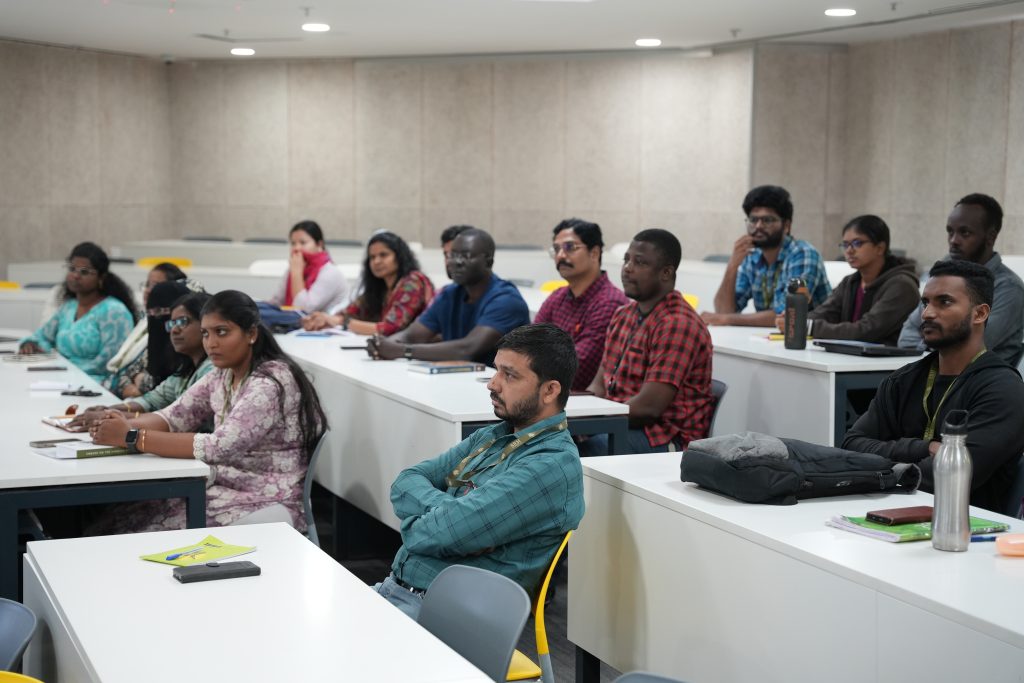SRM-AP All News
ALL News
- Women in Leadership: Two-Day ICSSR-sponsored Conference Come to a Successful End January 27, 2025
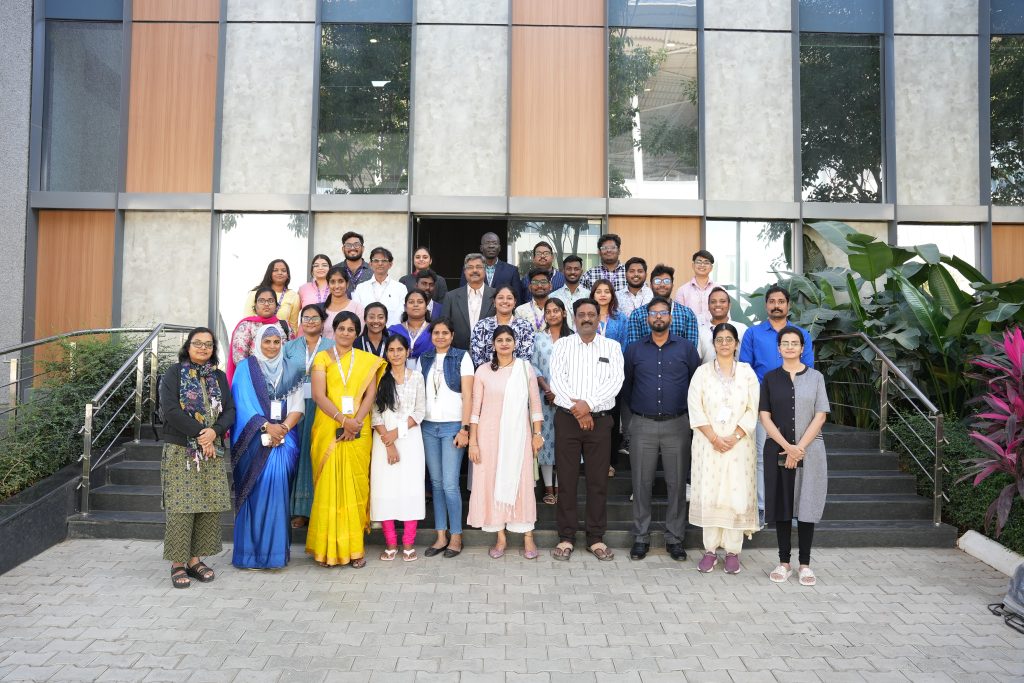
The Paari School of Business hosted its Two-Day ICSSR-sponsored National Conference on the theme “Women in Higher Educational Institutions (HEIs) and Career Progression” as part of the Vision Viksit Bharat@2047 initiative on January 23 – 24, 2025. This event brought together academics, delegates, and leaders to discuss research findings and actionable solutions for advancing gender equity in academia and leadership roles.
Prof. Bharadhwaj Sivakumaran, Dean – Paari School of Business, delivered the welcome address and officially inaugurated the conference. In his address, he highlighted the significance of the conference in promoting the Viksit Bharat Programme and fostering inclusivity in education, drawing attention to the persistent gender disparity in leadership roles within Indian academia, citing that very few Indian Institutes of Management (IIMs) have female directors and only a small percentage of Indian universities are led by women Vice-Chancellors. Prof. Bharadhwaj commended the efforts of researchers like Dr Kamesh, whose ICSSR-funded study on breaking the glass ceiling effect secured a ₹20 lakh grant, which focuses on understanding and addressing barriers that limit women’s progress to leadership positions in higher education.
The first keynote address was delivered by Ms Rekha V, Vice President of HR at vCom Solutions, California, on the glass ceiling effect, and its impact on women. She began by acknowledging the efforts of the organising committee in addressing this pressing issue and shared her perspective on the systemic barriers that hinder women’s advancement in leadership roles across sectors.
Ms Rekha commented, “There is a high underrepresentation of women in senior leadership roles, for example, in the tech sector. This disparity results from various biases that obstruct their career progression.” She emphasised that the challenges extend beyond mere representation, involving deeply ingrained issues such as unconscious bias, gender stereotypes, limited access to promotions, and inequitable pay structures, despite evidence showing that women often outperform their male counterparts.
She insisted organisations make conscious efforts to address these challenges by creating awareness about them, setting up mentorship programs, advocating for pay equity, and promoting transparent promotion practices. Her statement, “Be the change, Bring the change,” served as a reminder to actively contribute to creating diverse environments that champion gender equity and work towards shattering the glass ceiling and building societies where every woman has opportunities to rise to the highest levels. The keynote address concluded with an engaging Q&A session, during which the discussion focused on the thought-provoking questions asked by the audience.
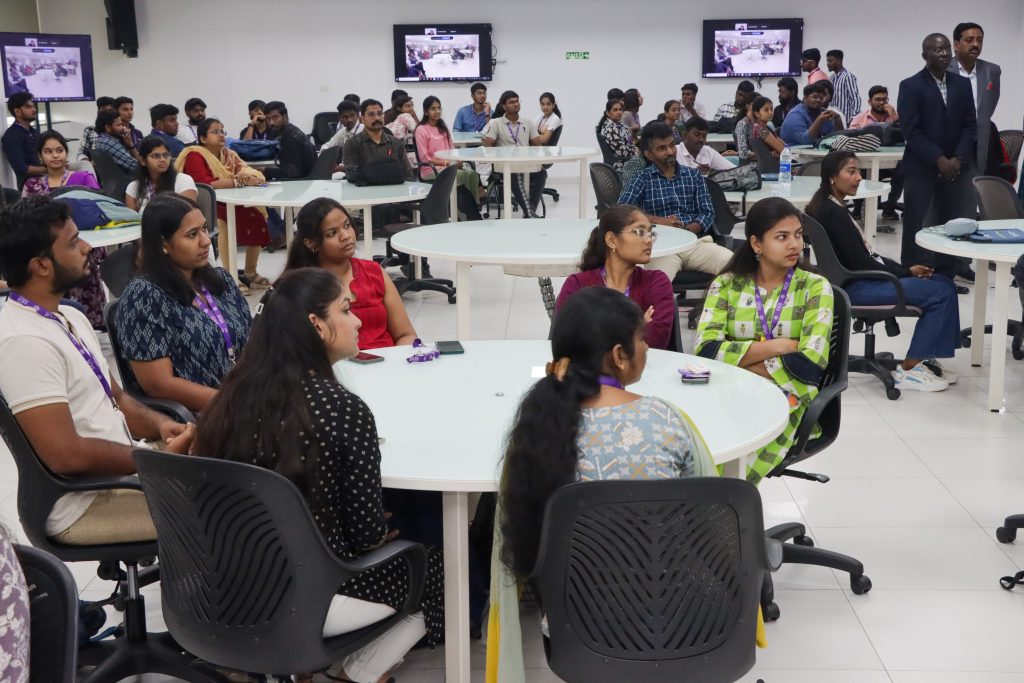
The second keynote address was delivered by Dr Syed Sadiq, a UN Women Representative from Kyrgyzstan. He commended the Paari School of Business and ICSSR for their dedication to advancing women’s rights and higher-education career opportunities. Reflecting on global progress since the first International Women’s Day in 1911, he highlighted achievements like equal voting rights, leadership opportunities, and establishing landmark treaties like the UN CEDAW (Convention on the Elimination of All Forms of Discrimination Against Women).
Despite these advancements, Dr Syed spoke about the persistent challenges women face in achieving equal pay, breaking barriers to leadership, and addressing workplace discrimination. He emphasised the need for gender-inclusive policies in higher education, targeted funding, mentorship programs, and stronger laws to combat harassment and discrimination. His “Change the Trend” and “Women Deserve More” statements were inspiring. He also discussed how systemic efforts that align with the Sustainable Development Goals (SDGs) can bring meaningful change to ensure no one is left behind.
The two-day conference also had various sessions on the barriers and biases that lead to the underrepresentation of women in leadership roles. The event concluded with a felicitation ceremony where both speakers were awarded a memento in appreciation of their remarkable sessions as keynote speakers.
Continue reading → - 3-Day Conference on “From Big Bang to Now” Concludes January 27, 2025
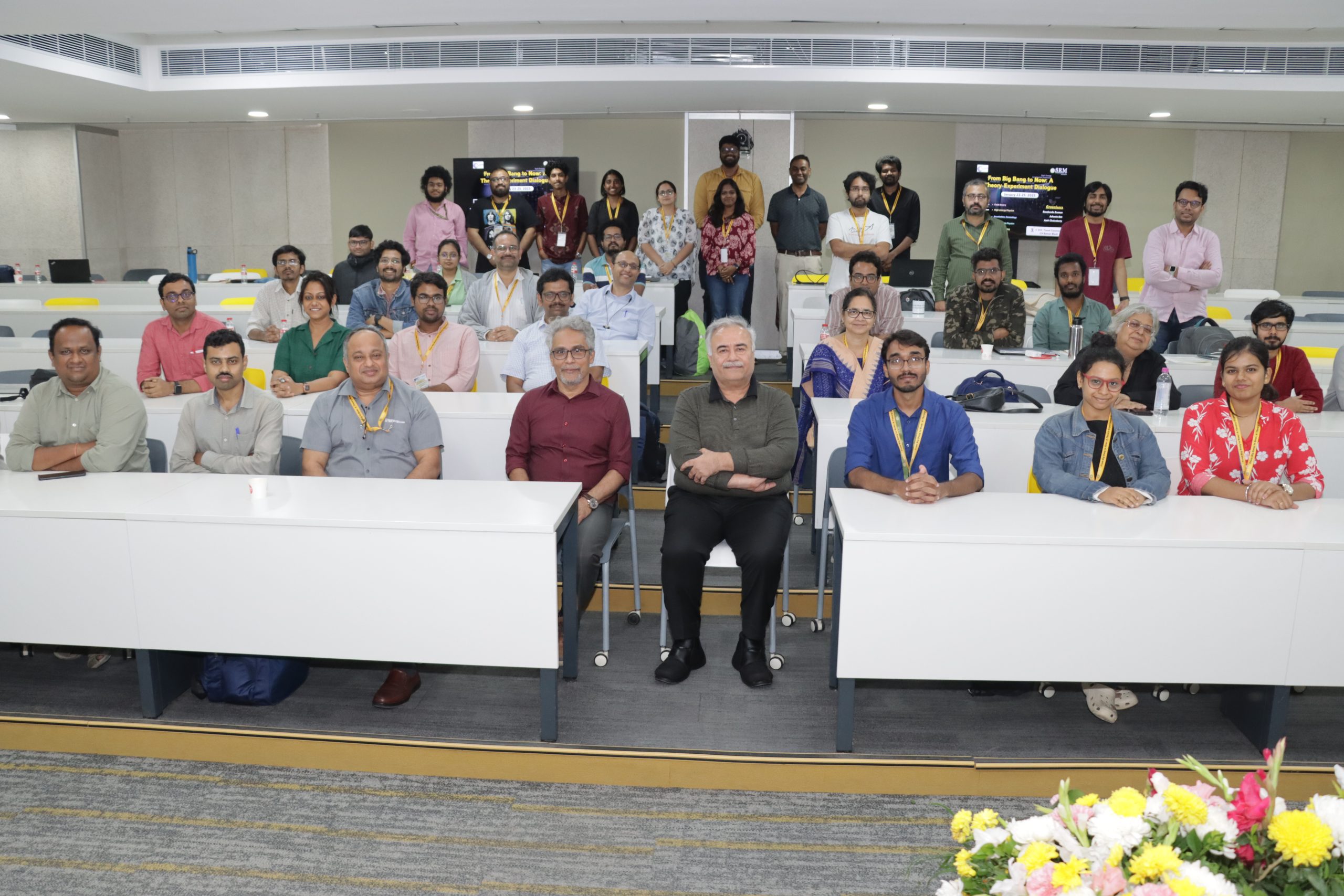 The Department of Physics organised a 3-day conference on “From Big Bang to Now : A Theory-Experiment Dialogue.” The event witnessed the presence of – Prof. Ranjit Thapa, Dean-Research; Dr C V Tomy, Dean-School of Engineering and Sciences, Dr Pranab Mandal, Head – Department of Physics, Prof. Sreerup Raychaudhuri along with Assistant Professors Dr Ashmita Das, Dr Basabendu Barman and Dr Amit Chakraborty.
The Department of Physics organised a 3-day conference on “From Big Bang to Now : A Theory-Experiment Dialogue.” The event witnessed the presence of – Prof. Ranjit Thapa, Dean-Research; Dr C V Tomy, Dean-School of Engineering and Sciences, Dr Pranab Mandal, Head – Department of Physics, Prof. Sreerup Raychaudhuri along with Assistant Professors Dr Ashmita Das, Dr Basabendu Barman and Dr Amit Chakraborty.As part of the inaugural address Dr C V Tomy highlighted the varsity’s prowess in terms of its accomplishments for a relatively young University, he stated that the varsity’s H-index of 59 reflects its significant global impact, the department of physics has also been the FIST sponsored Department among many other departments in the university.
Prof. Ranjith Thapa in his address stated, “SRM University-AP is a self-reliant institution, generating its own resources to fund cutting-edge research and education,” he also welcomed students to be a part of the academic community at SRM AP.
The Department head, Dr Pranab Mondal stated, “Since the inception we have grown tremendously as a department and as a university, both in terms of academic output and research impact. We also focus on actively collaborating with other departments to focus on not just research but also on advancing higher education and have strived to make the department what it is today.”
Prof. Sreerup Rayachaudhuri, visiting professor at the varsity and former professor at the TIRF said, “There are 4 categories of universities in India, the IITs, the private universities, the government universities and research institutes. Although SRM AP is a private university, it strongly encourages research, the very existence of this conference today, exemplifies the varsity’s commitment to fostering research culture.”
The conference also featured engaging presentations and lectures by students and faculty from various prestigious institutions across India. The event served as a platform for knowledge exchange, and networking, further strengthening SRM University-AP’s reputation as a hub for academic and research excellence.
The 3-day conference concluded with a renewed commitment to spreading knowledge in the field theory, high-energy physics, Astroparticle physics and Machine Learning, ensuring that SRM University-AP continues to contribute significantly to global scientific progress.
Continue reading → - Student Athelete Deepthi Jeevanji Felicitated for Winning the Arjuna Award January 27, 2025
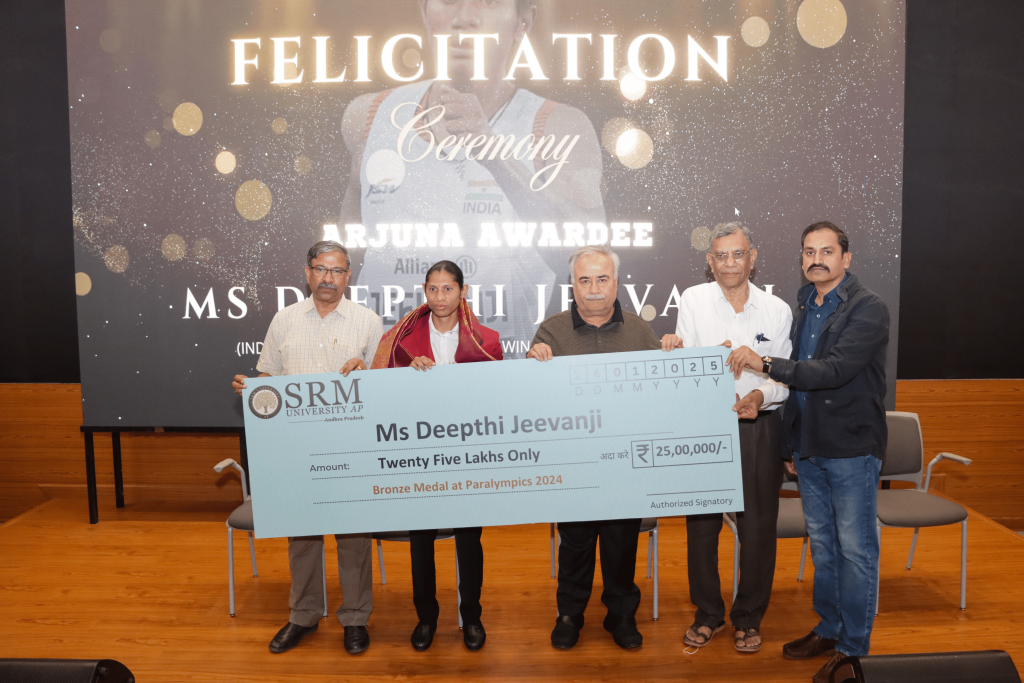
SRM University-AP honoured the accomplishments of its student and Paris Paralympian, Ms Deepthi Jeevanji, who is a recipient of the Arjuna Award this year on January 24, 2025. Deepthi, a student of commerce at the Paari School of Business, represented India at the Paris Paralympics 2024 in the 400-meter T20 event and secured a bronze medal, becoming the first intellectually impaired Indian athlete to win a Paralympic medal.
The felicitation ceremony featured Vice Chancellor Prof. Manoj K Arora, Registrar Dr R Premkumar, Director of Campus Life and Maintenance and Director I/C of Sports, Mr Anup Suryavanshi and Former IIT Madras Faculty, Prof. N Siva Prasad presented Ms Jeevanji with award cheques of rupees twenty-five lakh for her Paralympic success and an additional fifteen lakh rupees for winning the Arjuna Award.
The event served as a platform to encourage aspiring students to pursue sports and consider it as a career option. During the ceremony, Deepthi expressed her gratitude, stating, “It is an immense honour to represent my country on such a prestigious global platform. The support from the management, staff, and my teachers at SRM University-AP played a crucial role in helping me achieve success.”
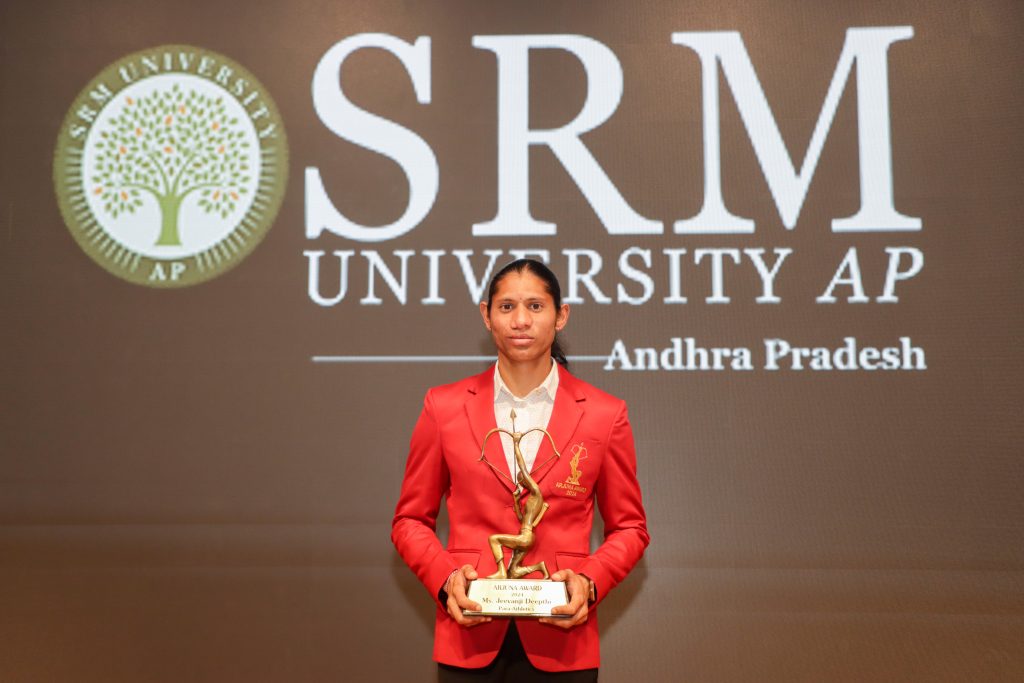
Vice Chancellor Prof. Manoj K Arora highlighted the importance of sports in education and the university’s commitment to fostering a culture of excellence. He stated, “We are proud of her achievement and hope she participates in the next Paralympics too, bringing gold to the country.” He also emphasised that the university is here to provide any form of support for her way forward in sports. Registrar Dr R Premkumar acknowledged Deepthi’s remarkable accomplishment and expressed pride in her historic success.
Director – Campus Life and Maintenance and Director I/C of Sports, Mr Anup Singh Suryavanshi, mentioned in the press meeting that followed, SRM University-AP has allocated seventy lakh rupees to encourage its high-performing students in sports. He noted that the university’s sporting infrastructure is on par with international standards and welcomes students from across the country to join its Sports Department.
The felicitation event also saw the announcements of the university’s upcoming National-Level Sports Fest, UDGAM 2025 which will see participation from over 3,200 students from across the country. Arjuna Awardee Ms Deepthi Jeevanji unveiled the event brochure to the members of the media.
Continue reading → - 76th Republic Day Celebrations: Student-Athlete and Olympian Jyotika Sri Dandi Rewarded with Cash Prize January 27, 2025
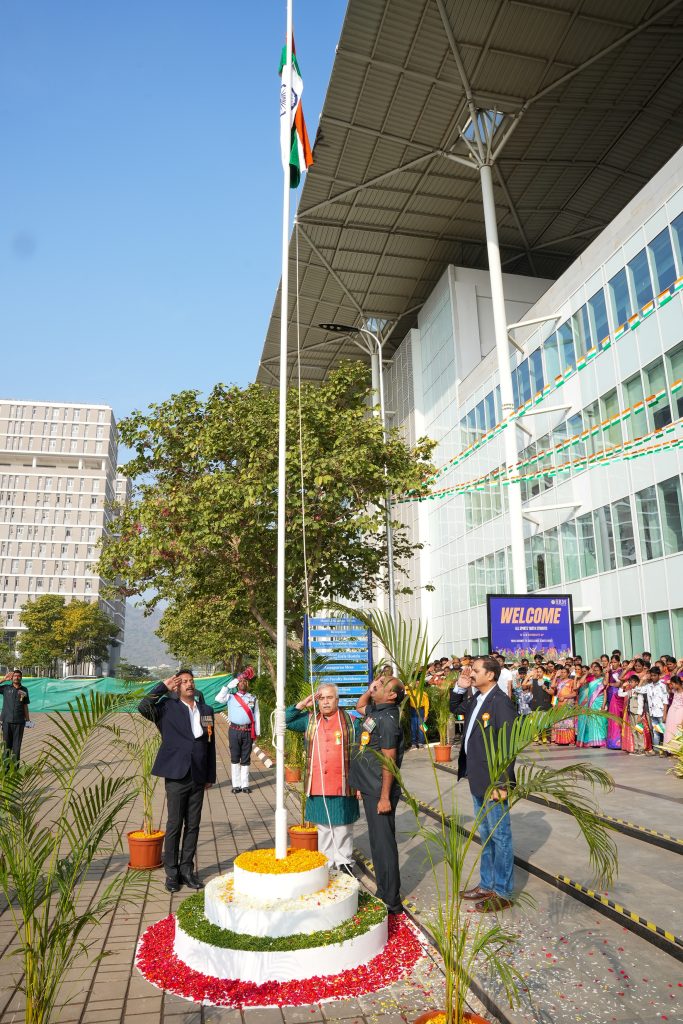
SRM University-AP honoured the 76th Year of India as a Republic with regal celebrations at the campus. Vice Chancellor Prof. Manoj K Arora hoisted the flag in the presence of Registrar Dr R Premkumar, Deans and Directors, faculty, staff and students, followed by a parade by the security staff of the university. Ms Jyotika Sri Dandi, student of Easwari School of Liberal Arts who represented the Indian team at the Women’s 4x400m Relay for the Paris Olympics 2024, was also present for the occasion.
In his address, Prof. Manoj K Arora spoke about the country’s golden heritage and the battle for freedom led by our freedom fighters and visionary leaders, which led to the momentous victory of Purna Swaraj. He underscored the significance of our Constitution representing the values that unite the diverse nation. “Our country has developed in leaps and bounds with our pivotal position on the global economic front, achievements in education and sports, and our advanced space programme. India is on its way to becoming a developed nation by 2047, and we must strive together as citizens to achieve this inclusive vision,” stated Prof. Arora in his address. He also briefed on the university’s stellar growth in academics, research and innovation, entrepreneurial startups, infrastructure and the plan for the upcoming year.
The celebration also witnessed the felicitation of the student-athlete and Olympian, Ms Jyotika Sri Dandi, who participated in the Paris Olympics 2024. The university awarded her a reward cheque of Rs 20 Lakhs for her remarkable contribution to Indian sports and her alma mater. In her address of gratitude, she stated, “SRM University-AP provided me with immense support for my academics with scholarships and the best resources for training. With two Olympians already in its fold, I am sure that in 10 years we will harbour the best contingent of athletes and academicians among all Indian universities.”
Pro-Chancellor Dr P Sathyanarayanan sanctioned Rs 70 lakh to be awarded to students who have won various national and inter-university sports championships. Cash prizes ranging from Rs 15,000 to Rs 1,00,000 were awarded to student-athletes for their exemplary sports performances during the event. Faculty and staff who have rendered five years of service to the university were also honoured with a memento and certificate in recognition of their contribution to the university’s development. The Republic Day celebrations concluded with various cultural programmes by students celebrating the diversity of the great nation.
Continue reading → - SRM AP Partners with Uniglobus Electrical and Electronics Pvt. Ltd. for EC-less LED Lighting Research January 24, 2025
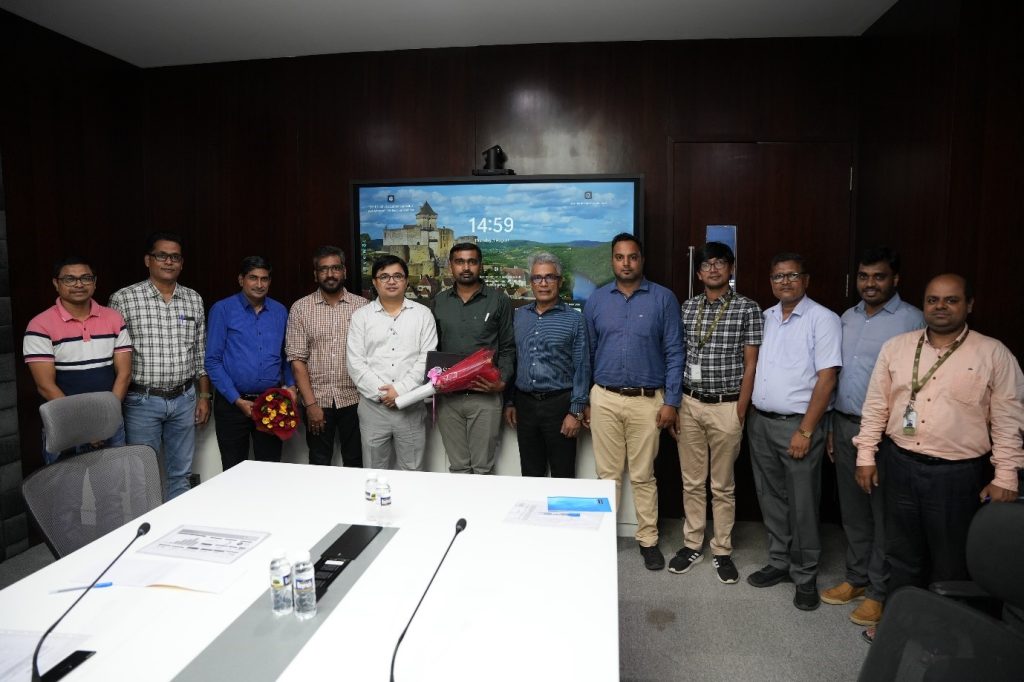
In a significant stride towards advancing sustainable energy technologies, SRM University-AP has signed an Memorandum of Understanding (MoU) with Uniglobus Electrical and Electronics Pvt. Ltd. The collaboration aims to develop cutting-edge EC-less LED lighting systems through a joint research initiative. The partnership was formalised following an exploratory visit by Uniglobus representatives, Mr Gajanan Inamdar and Mr Saurabh Maheta, to SRM AP. During their visit, they engaged in extensive discussions with the university faculty, identifying EC-less LED drivers as a promising area for impactful research.
Dr Ramanjaneya Reddy Udumula, Assistant Professor from the Department of Electrical and Electronics Engineering, will lead this innovative project as the Principal Investigator. Highlighting the significance of the collaboration, he noted, “This research initiative will address critical challenges in energy-efficient lighting while fostering a bridge between academic insights and industrial expertise.”
Uniglobus has also invited Dr Udumula to visit its state-of-the-art facilities to gain an in-depth understanding of their advanced product line. This visit underscores the mutual commitment to fostering a symbiotic relationship between academia and industry, paving the way for groundbreaking technological advancements.
Key figures instrumental in making this collaboration a reality include Vice Chancellor Prof. Manoj K. Arora, Prof. Ranjit Thapa, Dean of Research; Prof. Vinod Kumar G S, Associate Dean of the Technology Transfer Cell; and Prof. C.V. Tomy, Dean of the School of Engineering and Applied Sciences (SEAS). Their collective efforts, alongside the support of Mr BS Praveen from Uniglobus, have laid the foundation for this transformative partnership.
The project focuses on addressing critical global challenges associated with energy sustainability and efficiency. With the rapid industrial growth and increasing global population driving energy demand, the limitations of conventional energy sources have become a pressing concern. Governments and industry leaders worldwide are calling for innovative solutions to promote energy-saving and sustainable technologies.
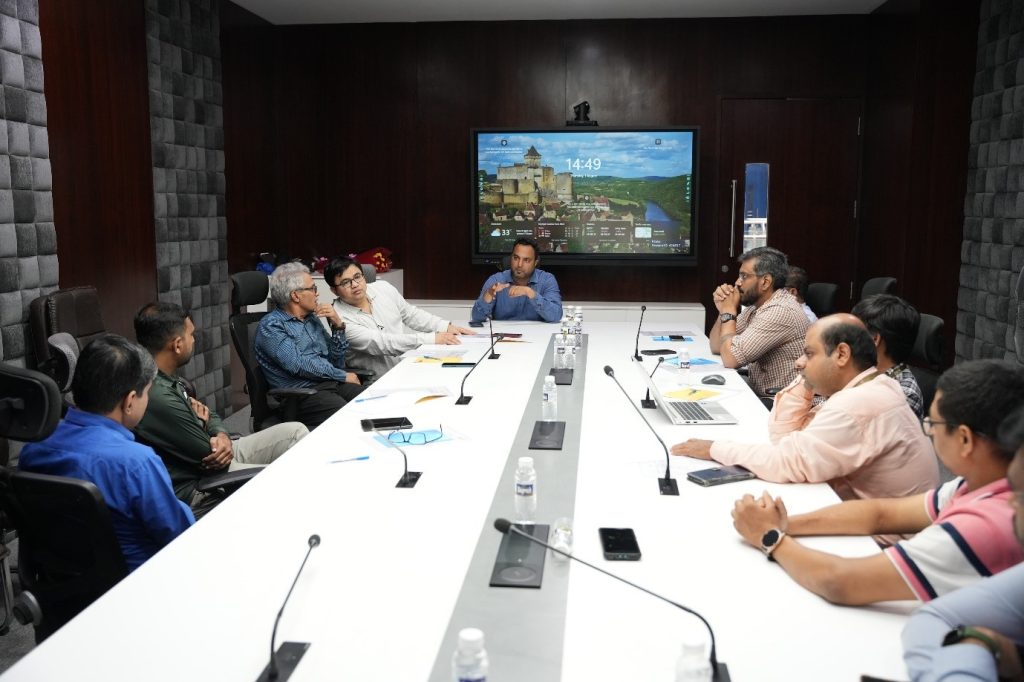
A Game-Changing Innovation
The research aims to develop an Electrolytic Capacitor (EC)-less, ripple-free LED driver system. Unlike conventional LED drivers, this system employs a DC-DC converter as a power factor correction (PFC) unit and a bi-directional buck-boost converter (BDC) to eliminate second harmonic ripples. This configuration simplifies control mechanisms while ensuring high power factor and reduced total harmonic distortion, delivering a steady DC current to the LED load.
Towards a Sustainable Future
This collaboration marks a significant milestone in addressing sustainability challenges through innovation. By merging the academic expertise of SRM University-AP with the industrial insights of Uniglobus Electrical and Electronics Pvt. Ltd., the partnership seeks to deliver impactful solutions for a greener, more sustainable future.
The MoU underscores SRM University-AP’s commitment to fostering innovation through strategic collaborations, positioning the institution at the forefront of research and technological development in energy efficiency. Both partners look forward to a fruitful and enduring collaboration that promises to benefit society at large.
Continue reading → - The Key to a Transformative Future – Systems Engineering Summit 2025 at SRM AP January 24, 2025
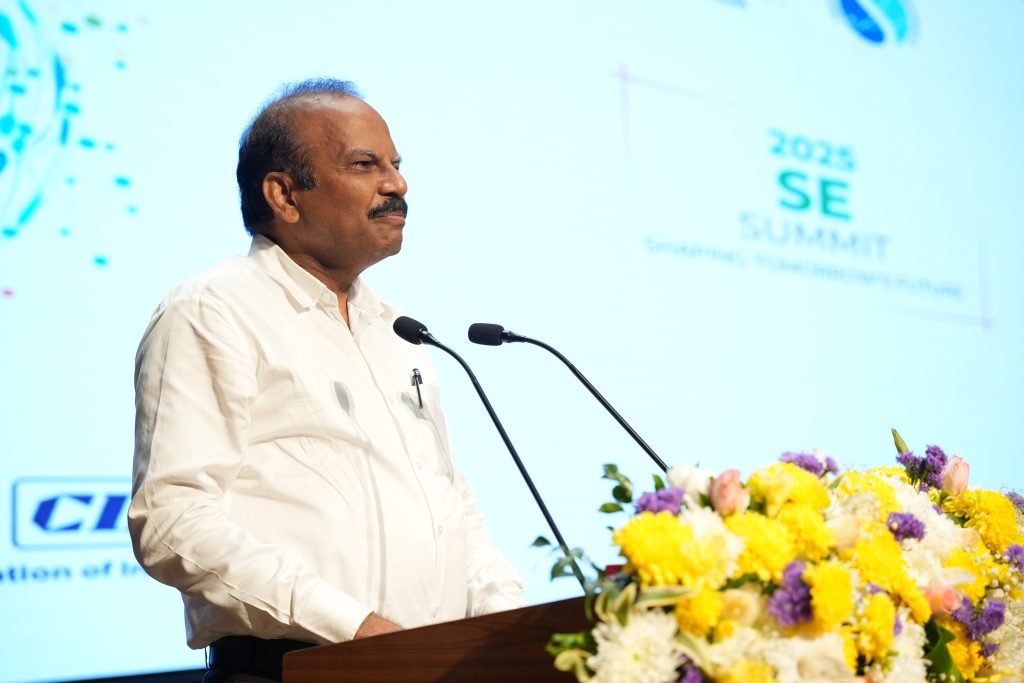
“The future is going to be a system of systems,” – Mr Dasari Ramakrishna, CEO & MD of Efftronics Systems Pvt. Ltd. at the Systems Engineering Summit 2025 hosted by SRM University-AP.
SRM University-AP kicked off the prestigious Systems Engineering Summit 2025 (SES 2025) on January 23, 2025, partnering with Efftronics Systems Pvt. Ltd., INCOSE India, IEEE Systems Council, Confederation of Indian Industry (CII) and the Information Technology Association of Andhra Pradesh (iTAAP). This two-day summit, to empower the next generation of system engineers, is designed as an outreach initiative to introduce students, faculty, and industry professionals to fundamental concepts, techniques, and exciting career thoughts in systems engineering.
Vice Chancellor, Prof. Manoj K Arora remarked, “Systems Engineering is a highly interdisciplinary field that overarches all branches of engineering and management disciplines. The SES 2025 is an informative platform for young engineers to understand how systems engineering drives innovation in today’s complex world.”
This summit brought together thought leaders and industry practitioners from different sectors, such as aerospace, automotive healthcare, defence, and industry manufacturers, for an array of keynote sessions and panel discussions on systems engineering as a key to navigating the transforming world. Mr Dasari Ramakrishna of Efftronics Systems Pvt Ltd opined that Systems Engineering provides exceptional aspirational directions and career thoughts. He said that in this rapidly evolving world, automation with a system of systems integration is the future, and it is time to introduce the concept into the curriculum of higher educational institutions.
An MoU was signed between SRM University-AP and Efftronics Systems Pvt. Ltd. to ensure active industry participation in academia, bridging the gap between the classroom and the workforce. SRM University-AP and the other participating universities, VIT-AP University, Vignan University, Siddhartha Academy of Higher Education, and Acharya Nagarjuna University, also signed an MoU with INCOSE India, exploring various opportunities to ensure the academic curriculum of the universities are made industry-ready.
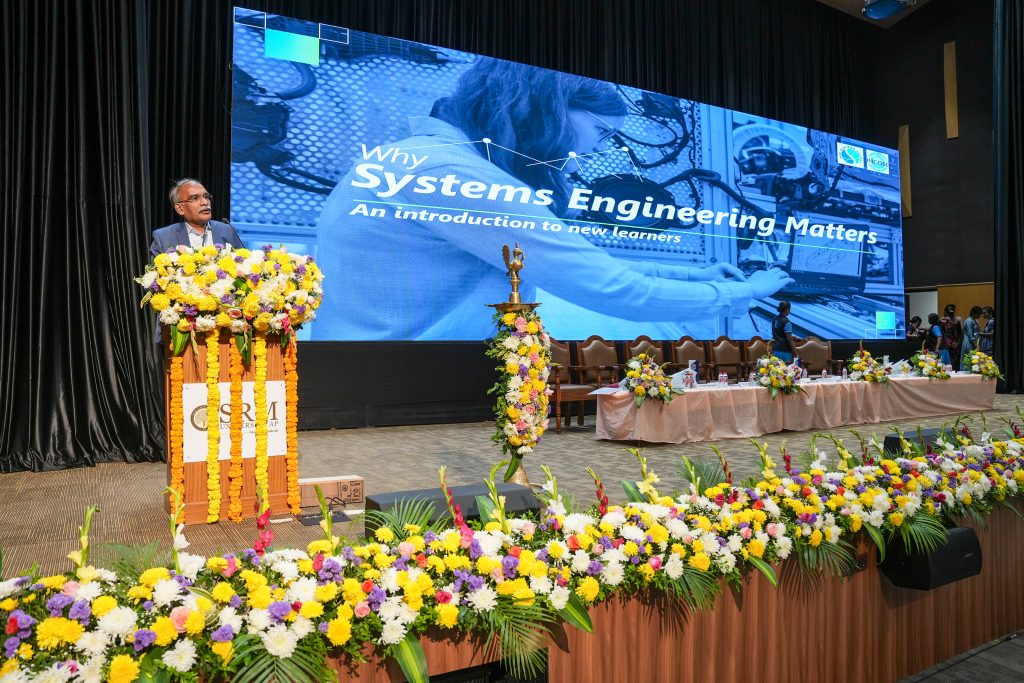
Dr Yogananda Jeppu, Executive Committee Member – Academia, INCOSE India, Technical Fellow and Systems Architect – Boeing, stated, “The collaboration between industries and educational universities is the driving force of innovation. In a world of interconnectedness and complexity, systems engineering is the interdisciplinary field that will break the silos and bring innovation through its methodology.”
Notable dignitaries from industry, academia and the government including Smt. Lakshmi Mukkavilli, President, IT Association of Andhra Pradesh, MD – Patra India BPO Services; Dr S V Kota Reddy, Vice Chancellor, VIT-AP University; Prof. Paruchuri Venkateswara Rao, Vice Chancellor, Siddhartha Academy of Higher Education; Prof. K Gangadhara Rao, Vice Chancellor, Acharya Nagarjuna University; Cmde. Dr M S Raghunathan, Registrar, Vignan University; Dr Maheswar Dwivedy, Associate Dean – Academia-Industry Relations and Professional Internships, SRM AP also shared their insights on the significance of this prestigious summit.
The Systems Engineering Summit 2025 organised as a joint initiative by SRM AP and various organisations, proved to be not just a summit but a call for action. The summit inspired a meaningful dialogue to create a roadmap for technological advancements in systems engineering for a more equitable and more sustainable society.
Continue reading → - Sai Likhita to Join ISRO as Scientist C January 20, 2025
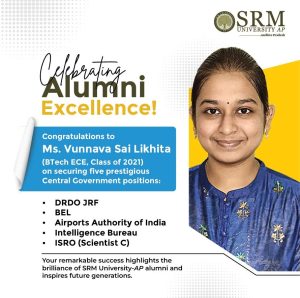 Ms Vunnava Sai Likhita, an alumnus of SRM University-AP from the 2021 BTech Electrical and Electronics Engineering batch, has successfully secured four esteemed Central Government jobs. Hailing from Prakasham District in Andhra Pradesh, Likhita has diligently worked her way to secure four Central Government positions. Post her BTech in Electronics and Communications Engineering (ECE) from SRM University-AP, she undertook coaching for the ISRO entrance exams while simultaneously preparing for the GATE examination.
Ms Vunnava Sai Likhita, an alumnus of SRM University-AP from the 2021 BTech Electrical and Electronics Engineering batch, has successfully secured four esteemed Central Government jobs. Hailing from Prakasham District in Andhra Pradesh, Likhita has diligently worked her way to secure four Central Government positions. Post her BTech in Electronics and Communications Engineering (ECE) from SRM University-AP, she undertook coaching for the ISRO entrance exams while simultaneously preparing for the GATE examination.In the 2024 GATE exam, Likhita achieved an impressive 268th rank, marking the beginning of her remarkable journey toward success.Post GATE, she tackled competitive exams for DRDO, Air Force, and BEL. Her hard work and determination bore fruit when she cleared the exams for all four positions, earning commendable ranks. However, Likhita chose to accept the offer from ISRO as Scientist C.
In the DRDO exam, Likhita secured the position of Junior Research Fellow (JRF), while in the Air Force exam, she was appointed as a Junior Executive. At BEL, she was selected as a Probationary Engineer, and in the Intelligence Bureau, she has secured the position of a Junior Intelligence Officer.
On this occasion, University Pro-Chancellor, Dr P Sathyanarayanan; Vice Chancellor Prof. Manoj K Arora, and the faculty members, Dr Sreenivasulu Tupakula, Dr V Sateeshkrishna Dhuli, and Dr K A Sunita congratulated their former student.
Reflecting on her journey, Likhita stated, “Becoming an ISRO Scientist has always been my ambition. Upon completing my BTech, while many opt for corporate careers, I remained steadfast in my goal to serve my country. Today, I am proud to say that my dream has come true. My uncle at DRDO has been a source of inspiration for me. The encouragement from my parents and professors at SRM AP has played a pivotal role in helping me achieve my aspirations, and I am grateful for their unwavering support.”
Continue reading → - Lecture on Experimental Research Design by Prof. C Raghunath January 16, 2025
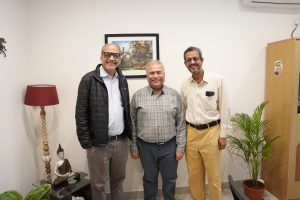 The Department of Management under the Paari School of Business organised an engaging interactive session with Faculty and PhD Scholars on Experimental Research Design. The session was addressed by Prof. Raghunath Singh Rao, Professor of Marketing at UT, University of Texas, Austin. The event provided an insightful discussion on Marketing Research where Prof. Raghunath Singh Rao shared personal insights on his research and experiments conducted in India since 2014.
The Department of Management under the Paari School of Business organised an engaging interactive session with Faculty and PhD Scholars on Experimental Research Design. The session was addressed by Prof. Raghunath Singh Rao, Professor of Marketing at UT, University of Texas, Austin. The event provided an insightful discussion on Marketing Research where Prof. Raghunath Singh Rao shared personal insights on his research and experiments conducted in India since 2014.During the session, Prof. Rao discussed a specific experiment in the healthcare sector, highlighting the necessity of preventive healthcare in rural areas. He also presented findings from an experiment focused on the role of incentives for medical representatives and how these incentives influence their performance and sales strategies. His expertise on designing and implementing field experiments in India, offering practical insights and methodologies for conducting impactful research in the Indian context.
The outcome of the programme was two-fold. First, participants learned how to conduct in-field experiments addressing practical problems in India. Prof. Raghunath Singh Rao provided a framework for identifying relevant issues and designing experiments that can yield actionable insights. Second, attendees gained a comprehensive understanding of effectively conducting these experiments. Key points emphasised included the importance of clear objectives, selecting appropriate control and treatment groups, ensuring ethical considerations, and maintaining rigorous data collection and analysis methods. Prof. Rao also highlighted the need for adaptability in the field, considering local contexts and potential challenges. Additionally, the session covered how to conduct research through mathematical models, providing a robust approach to analysing complex data and deriving meaningful conclusions. This knowledge equips researchers with the tools to design and implement impactful field experiments, ultimately contributing to solving real-world problems in India
Continue reading → - Patent on SQL Free Database Interaction January 9, 2025
This research, by Dr Ashu Abdul, Assistant Professor and research scholar Ms Surya Samantha Beri along with forth-year student, Mr Jakkampudi Venkatasubbaiah from the Department of Computer Science and Engineering explores a framework designed to help users retrieve and analyse data without requiring any Structured Query Language (SQL) knowledge. The patent titled, “System and Method for Generating Structured Queries from Natural Language Inputs , with application no: 202441096460 is particularly relevant as it enables individuals, like a car dealer seeking sales insights, to interact with their databases using everyday language. Such accessibility underscores the importance of this research in democratising data access for all users.
Abstract:
This project is centred around creating a framework that translates user queries into SQL statements and retrieves results without requiring any SQL knowledge from the user. By delving into the workings of various RDBMS systems, with a special focus on MySQL, I developed a solid understanding of database architecture and how databases are engineered for optimized performance. This knowledge was critical in designing a system that can seamlessly interact with any given database, analyse it, and provide relevant results in response to user input.
About the Framework:
This framework is intended to convert the user queries into SQL statements and attain the results from the database without intervention of SQL coding. Every time writing multiple SQL commands to apply filters, commands, and extracting data is time-consuming and requires having knowledge of SQL knowledge. This project is intended to analyze a database and answer the questions that are related to a particular database without writing SQL commands.
Explanation in Layperson’s Terms:
In-General we rely on programmers who are efficient in programming SQL for finding the insights from the database which are related to business or information. So, Laymen cannot access data without knowing SQL this project makes it possible. Assume, Mr. A a car dealer owns a showroom has a software dealing with his Business he wants to access his data and get insights for understanding the sales. Now he is not familiar with using SQL so he relies on someone for that or opens software and applies multiple filters to analyze his data. But What if he can use a chatbot and get solutions for all his questions from his database?
Mr.A can get conclusions from his data within no-time that thought represents this entire project.What are the use cases of this framework to a layman?
Laymen interaction with the database for understanding their data. Reducing the requirement to understand and search for the filters in the front-end. Faster data extraction from the database. Generating the results based on user queries in natural language without SQL coding. Elimination of time and efforts required for writing SQL Commands or applying filters. Understanding data gets easier for engineers as well as unknown data can be understood easily.
Practical Implementation:
This project has been successfully integrated into several existing real-time applications, enabling precise identification of data locations. By fine-tuning and enhancing our algorithms, we have achieved significant improvements in accuracy. In practical terms, users can effortlessly explore and comprehend their data.
Furthermore, extensive testing across databases of varying sizes has demonstrated the project’s ability to deliver significant and well-structured results.
Future Enhancements:
Incorporating Natural Language Processing (NLP) to process and respond to queries in users’ native languages, including speech-to-text capabilities.
Facilitating the generation of dynamic reports in various formats such as PDFs and Excel sheets.
Expanding compatibility to support additional database systems like Oracle, PostgreSQL, and NoSQL models.
Enabling data extraction and analysis from Excel sheets and CSV files.
Continue reading → - ETOT 2024 : Advancing Optical Technology in India January 9, 2025
The Department of Physics organised the International Conference on Emerging Trends in Optical Technology (ETOT 2024), showcasing the latest advancements in the field of Optical Technology. The conference featured esteemed chairpersons Prof. R P Singh and Prof. Achanta Venugopal, alongside distinguished dignitaries including Registrar, Dr R Premkumar, Dean-SEAS , Prof. C V Tomy, and Dean-Research, Prof. Ranjit Thapa.
In his inaugural address, Dr Gangi Reddy Salla, Associate Professor and programme convenor from the Department of Physics, emphasised the vital role of Optical Technology in contemporary society. He stated, “This conference serves as a crucial platform for discussing the emerging trends and innovations in Optical Technology, reflecting its significance in various sectors today.”
The conference hosted 62 distinguished speakers from India and abroad, receiving a total of 103 abstracts, with 40 contributions from the university across various departments. As an association with IOP Proceedings, special acknowledgment will be featured in its upcoming issue. Additionally, the conference was generously supported by sponsors exceeding 10 lakhs, including notable companies such as ANRF, ATOS, Advanced Photonics,AIMIL and CIPHR and the University of Tartu. OPTICA also endorsed this significant event.
During the proceedings, five exemplary paper awards were announced in honour of the conference chairperson Prof. R P Singh. In his welcome address, Prof. C V Tomy remarked, “Despite being only seven years old, the university has made significant strides in research, this conference is testimonial to the varsity’s research excellence and will not just pave way for advancements in the field of optical technology, but will also fosters collaboration between industry leaders and academic experts.”
Prof. Achanta Venugopal highlighted the pressing need for a uniform curriculum in Optics and Photonics nationwide. He expressed concern over the lack of fabrication laboratories to expand research possibilities, saying, “Conferences like these can significantly impact our field by addressing the necessity for such facilities, prompting governmental action to support our academic aspirations.”
Prof. R P Singh urged attendees to broaden their research applications beyond academic papers, particularly in fields such as Agriculture and Medicine. He stated, “The utilisation of optical technologies can revolutionise these sectors, and it is essential for our research to resonate with real-world challenges and reach those in need.”
The event concluded with the recognition of the chairpersons by Registrar Dr R Premkumar, Dean-SEAS, Prof. C V Tomy, and Dean-Research, Prof. Ranjit Thapa. The release of the abstract book marked another highlight of the conference, with Dr Ravi Kumar delivering the vote of thanks. The event also featured insightful presentations and discussions from prominent speakers representing renowned institutions both in India and internationally.
Continue reading →


